Search Result
Results for "
active nucleoside
" in MedChemExpress (MCE) Product Catalog:
6
Isotope-Labeled Compounds
| Cat. No. |
Product Name |
Target |
Research Areas |
Chemical Structure |
-
- HY-119499
-
|
6-Mercaptoguanosine
|
Nucleoside Antimetabolite/Analog
|
Cancer
|
|
6-Thioguanosine (6-Mercaptoguanosine), an active nucleoside, is an Azathioprine metabolite. 6-Thioguanosine has immunosuppressive effects .
|
-
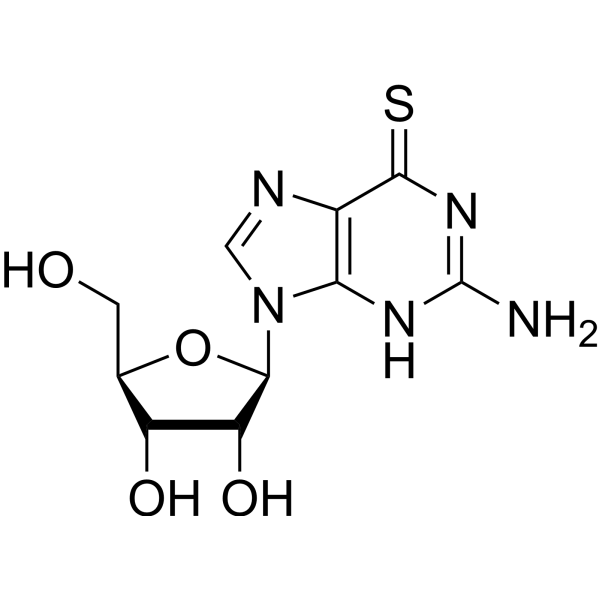
-
- HY-B0017
-
|
Epavudine; L-Thymidine; NV 02B
|
HBV
|
Infection
|
|
Telbivudine (Epavudine), an orally active thymidine nucleoside analog, is a potent antiviral inhibitor of hepatitis B virus (HBV) replication .
|
-
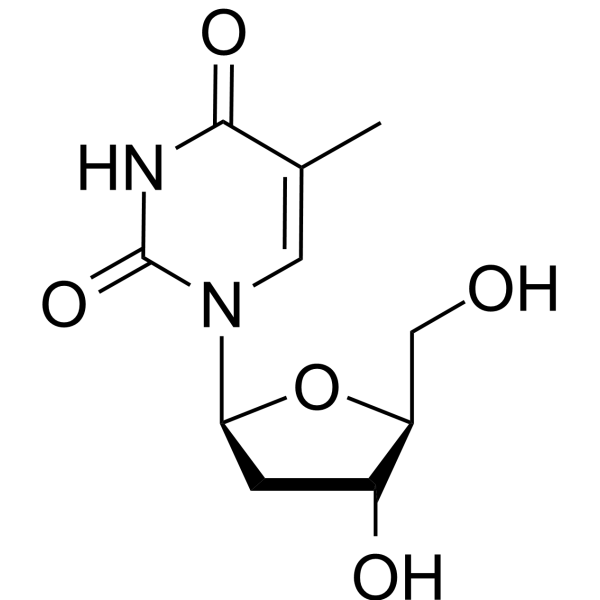
-
- HY-41344
-
|
|
Antibiotic
|
Infection
|
|
Ganciclovir mono-O-acetate is a derivative of Ganciclovir. Ganciclovir, a nucleoside analogue, is an orally active antiviral agent with activity against CMV .
|
-
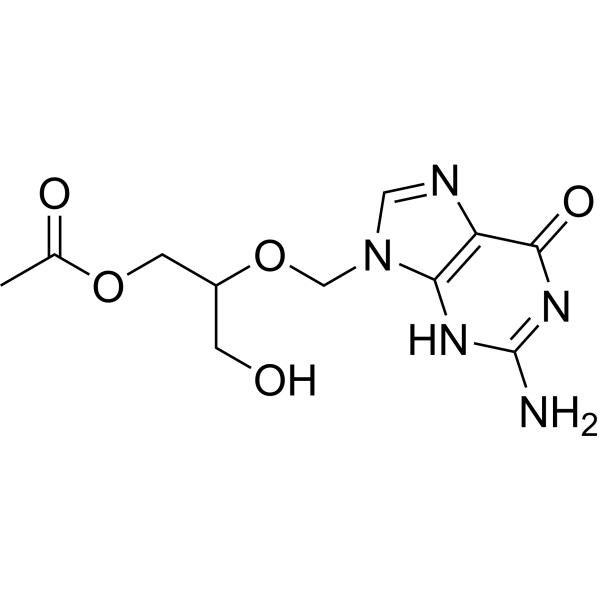
-
- HY-U00049
-
-
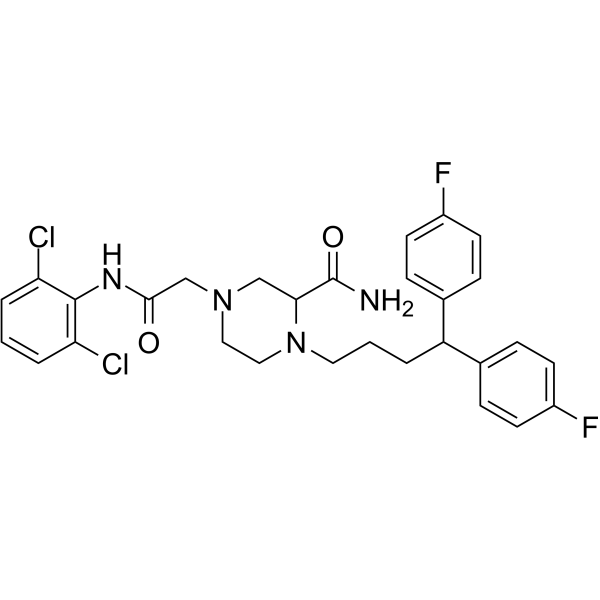
-
- HY-120248
-
|
|
Adenosine Deaminase
|
Cancer
|
|
FR221647 is an orally active non-nucleoside inhibitor of adenosine deaminase. FR221647 is not cytotoxic at a concentration of 100 μM .
|
-
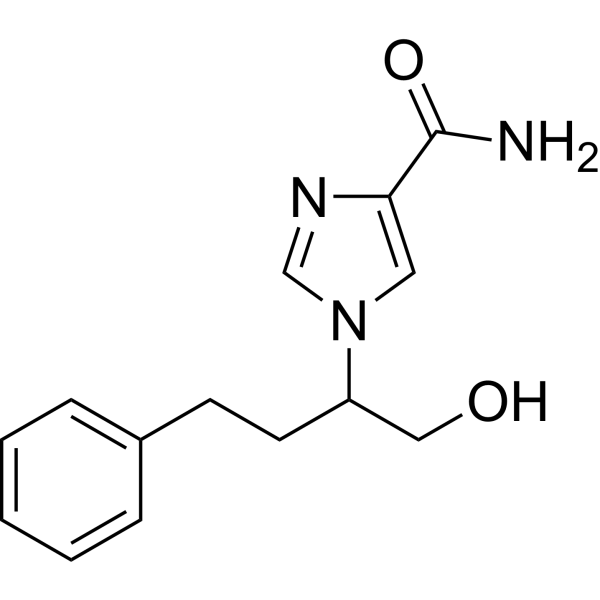
-
- HY-16445A
-
-
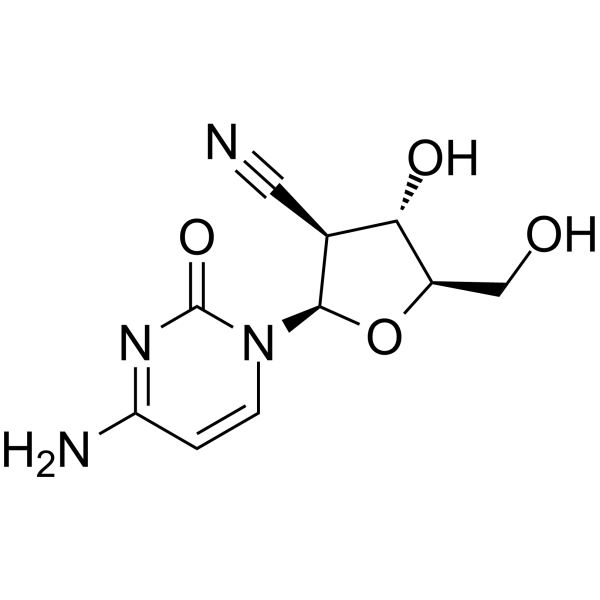
-
- HY-16445B
-
-
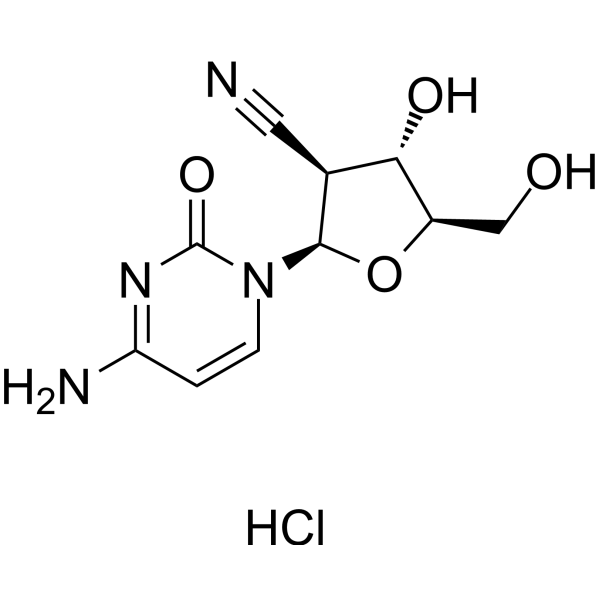
-
- HY-134909
-
|
|
DNA/RNA Synthesis
|
Infection
|
|
AS-136A is an orally active non-nucleoside inhibitor of the measles virus RNA-dependent RNA polymerase (RdRp) with an IC50 of 2 µM for measles virus .
|
-
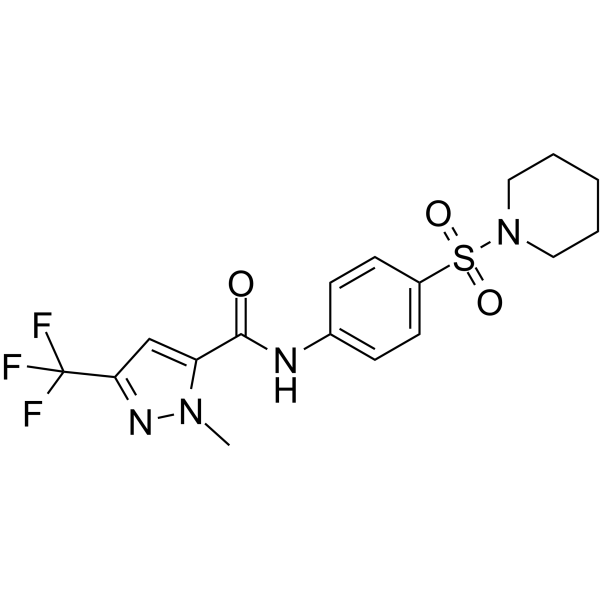
-
- HY-17426
-
|
BRL 42810
|
HSV
HBV
|
Infection
|
|
Famciclovir (BRL 42810) is an orally active nucleoside analogue. Famciclovir is an antiviral agent with potent activities against HBV, HSV and VZV. Famciclovir can be used for the research of herpesvirus infection .
|
-
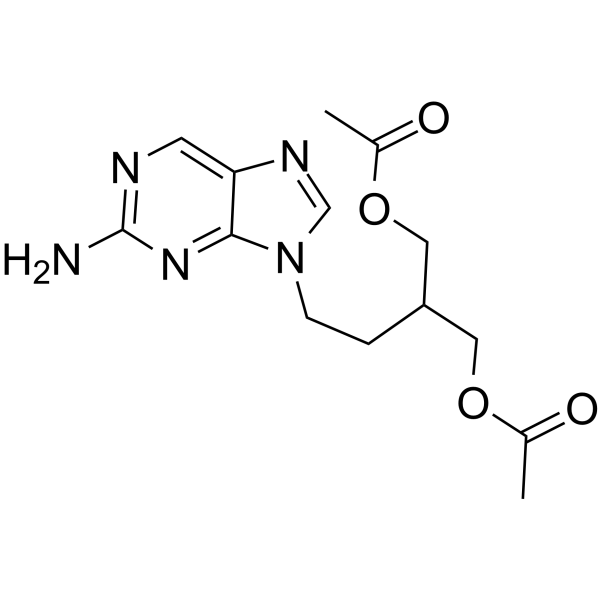
-
- HY-147411
-
|
MK-8507
|
Reverse Transcriptase
HIV
|
Infection
|
|
Ulonivirine (MK-8507) is an orally active non-nucleoside reverse transcriptase inhibitor with high antiviral activity. Ulonivirine can be used for the research of HIV-1 infection .
|
-
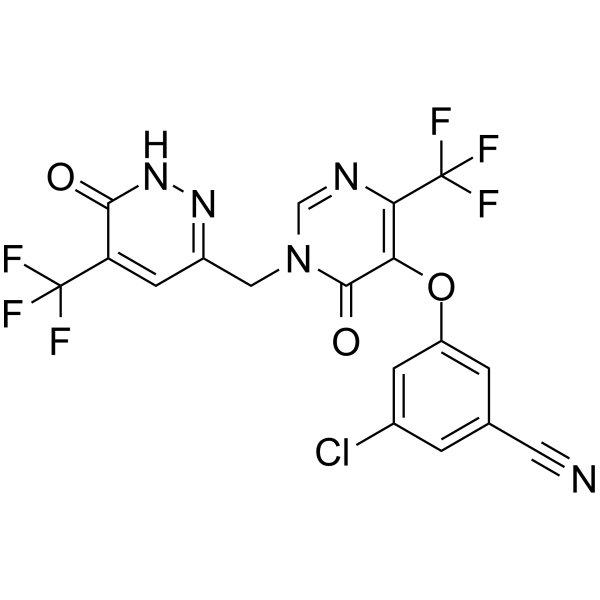
-
- HY-B0017S
-
|
Epavudine-d4; L-Thymidine-d4; NV 02B-d4
|
Isotope-Labeled Compounds
HBV
|
Infection
|
|
Telbivudine-d4 is deuterium labeled Telbivudine. Telbivudine (Epavudine), an orally active thymidine nucleoside analog, is a potent antiviral inhibitor of hepatitis B virus (HBV) replication[1].
|
-
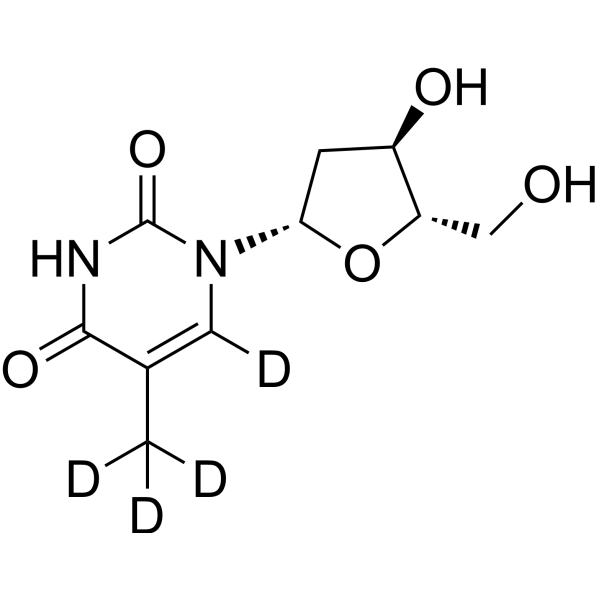
-
- HY-156599
-
|
|
HIV
|
Infection
|
|
Bavtavirine is a potent non-nucleoside reverse transcriptase inhibitors (NNRTIs). Bavtavirine is part of highly active antitiretroviral therapy (HAART) treatment regimen. Bavtavirine can be used for HIV disease research .
|
-
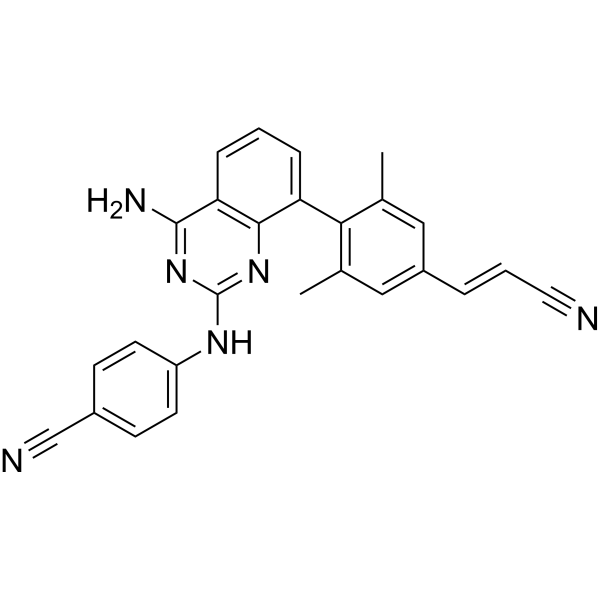
-
- HY-109016
-
|
FV-100 free base
|
Antibiotic
Bacterial
|
Infection
|
|
Valnivudine (FV-100 free base), a proagent of CF-1743, is an orally active anti-herpes zoster (HZ) nucleoside analogue. CF-1743, a bicyclic nucleoside analog (BCNA), has highly specific antiviral activity against varicella-zoster virus (VZV). Valnivudine is rapidly and extensively converted to CF-1743 in vivo .
|
-
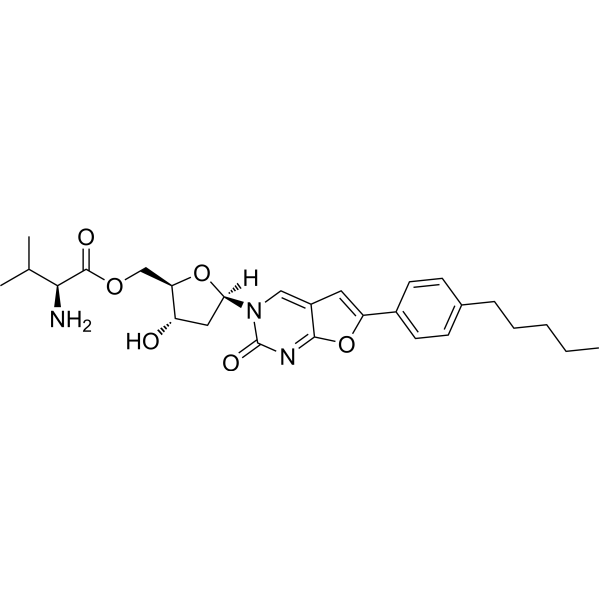
-
- HY-19851
-
|
GS-9131
|
|
|
|
Rovafovir etalafenamide (GS-9131), a proagent of the adenosine nucleotide analogue GS-9148, is an orally active nucleoside reverse transcriptase inhibitor (NRTI). Rovafovir etalafenamide is potent and active against a variety of NRTI mutants, and shows potent anti-HIV-1 activity .
|
-
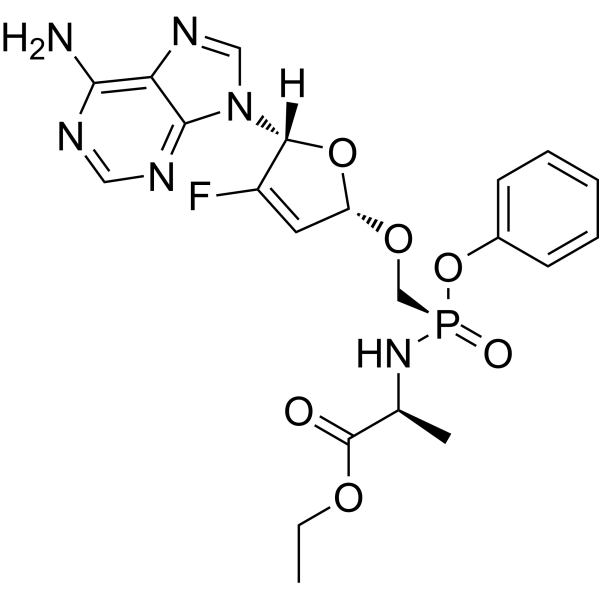
-
- HY-B0249
-
|
2',3'-Dideoxyinosine; ddI
|
HIV
Reverse Transcriptase
|
Infection
|
|
Didanosine (2',3'-Dideoxyinosine; ddI) is a a potent and orally active dideoxynucleoside analogue, and also is a potent nucleoside reverse transcriptase inhibitor. Didanosine shows antiretroviral activity for HIV .
|
-
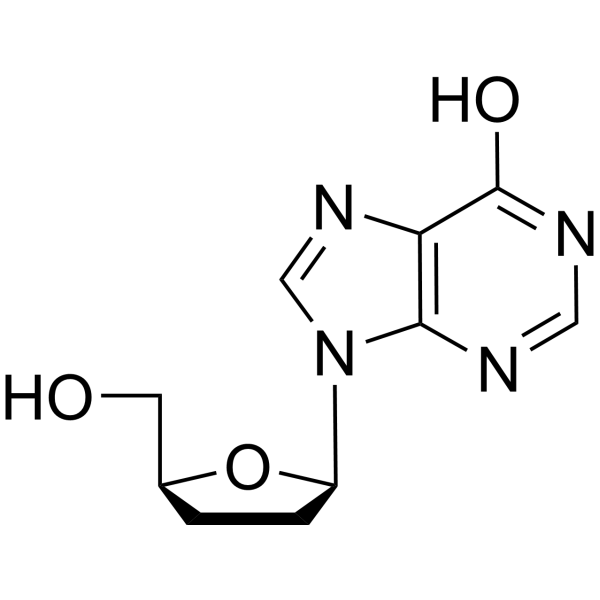
-
- HY-118047
-
-
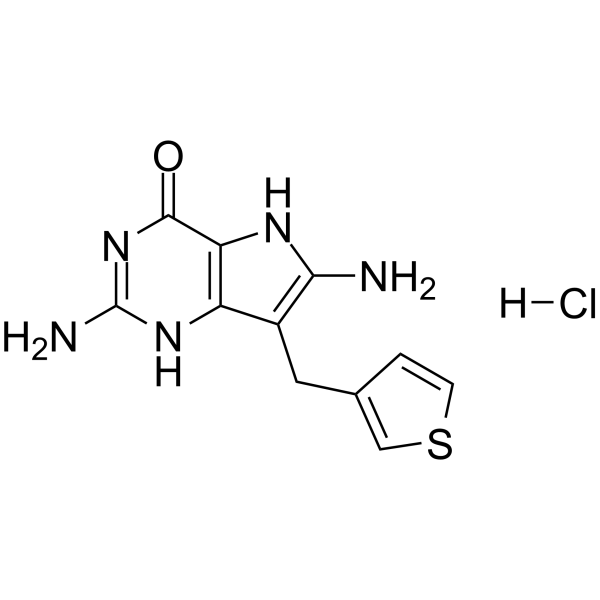
-
- HY-13672
-
-
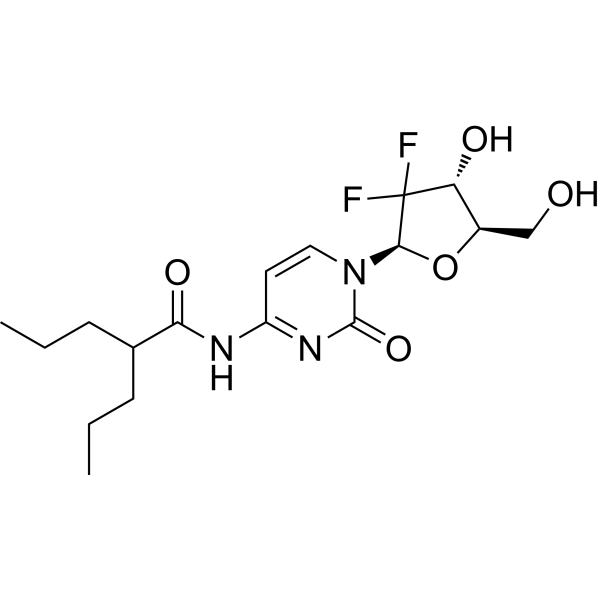
-
- HY-B0250
-
|
BCH-189
|
HIV
Reverse Transcriptase
HBV
|
Infection
Cancer
|
|
Lamivudine (BCH-189) is an orally active nucleoside reverse transcriptase inhibitor (NRTI). Lamivudine can inhibit HIV reverse transcriptase 1/2 and also the reverse transcriptase of hepatitis B virus. Lamivudine salicylate can penetrate the CNS .
|
-
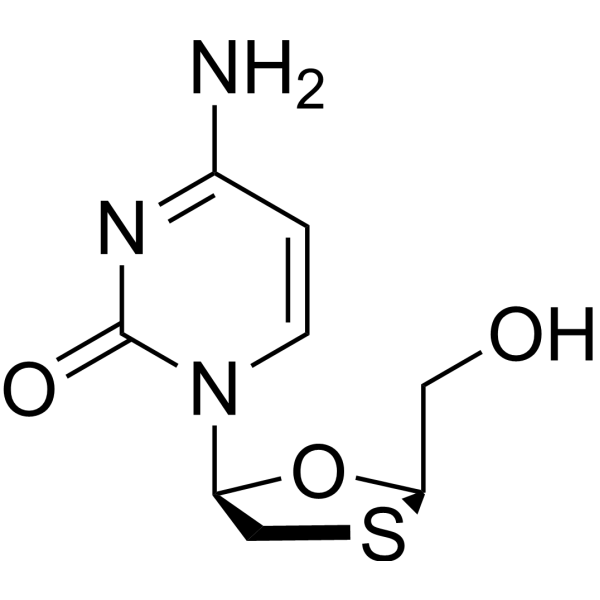
-
- HY-101634
-
|
|
HCV
|
Infection
|
|
ABT-072 is an orally active and potent non-nucleoside HCV NS5B polymerase inhibitor (HCV GT1a EC50=1 nM; HCV GT1b EC50=0.3 nM) .
|
-
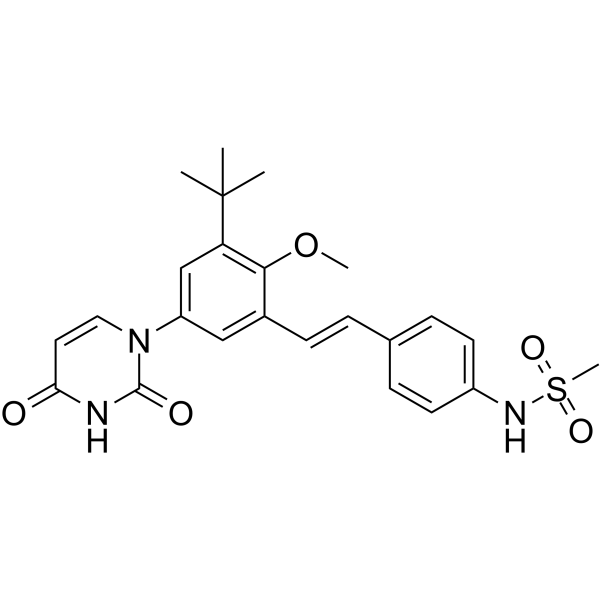
-
- HY-17423
-
|
|
HIV
Reverse Transcriptase
Telomerase
Apoptosis
|
Infection
Cancer
|
|
Abacavir is an orally active and competitive nucleoside reverse transcriptase inhibitor. Abacavir can inhibits the replication of HIV. Abacavir shows anticancer activity in prostate cancer cell lines. Abacavir can trespass the blood-brain-barrier and suppresses telomerase activity .
|
-
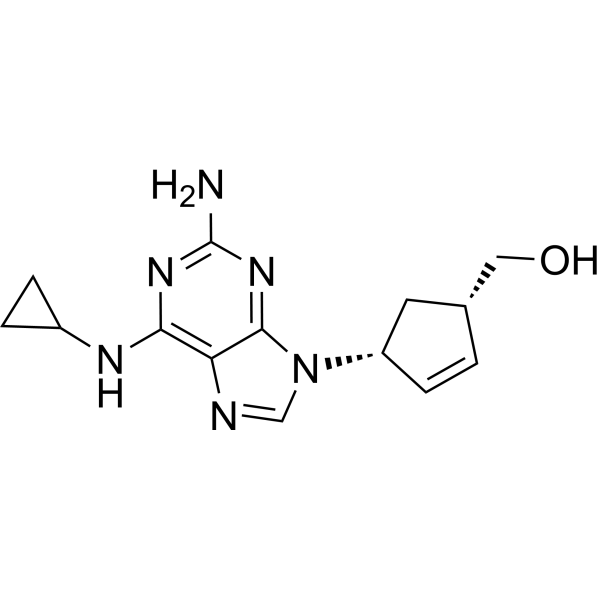
-
- HY-17423E
-
|
|
HIV
Apoptosis
Reverse Transcriptase
Telomerase
|
Infection
Cancer
|
|
Abacavir hydrochloride is a competitive, orally active nucleoside reverse transcriptase inhibitor. Abacavir hydrochloride can inhibits the replication of HIV. Abacavir hydrochloride shows anticancer activity in prostate cancer cell lines. Abacavir hydrochloride can trespass the blood-brain-barrier and suppresses telomerase activity .
|
-
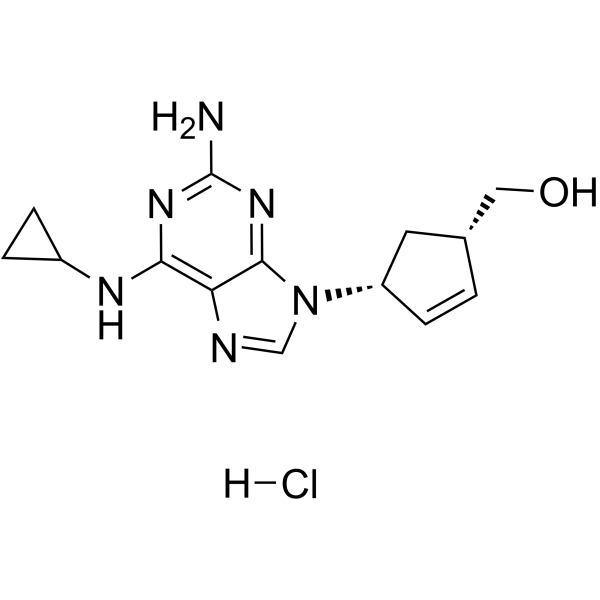
-
- HY-14922
-
|
|
Reverse Transcriptase
HIV
|
Infection
|
|
Fosalvudine tidoxil is an orally active nucleoside reverse transcriptase inhibitor (NRTI). Fosalvudine tidoxil is a prodrug derived from Alovudine (HY-B1516). Fosalvudine tidoxil is less toxic than Alovudine and can be used for the research of HIV-1 infection .
|
-
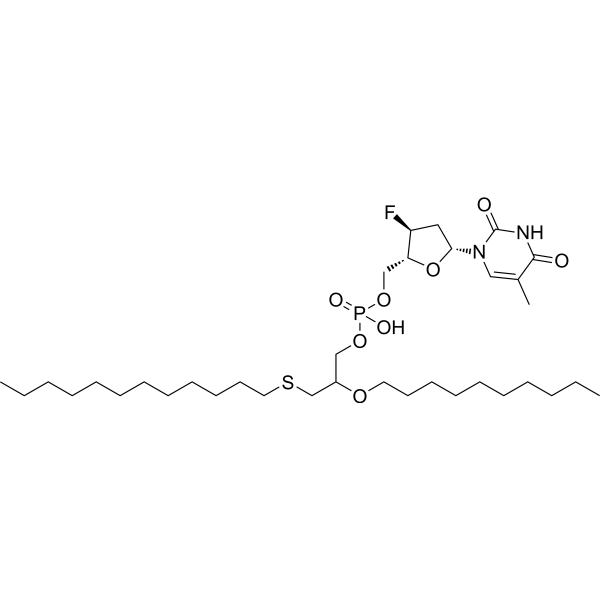
-
- HY-123032
-
|
BV-araU
|
DNA/RNA Synthesis
|
Infection
|
|
Sorivudine (BV-araU) is an orally active synthetic pyrimidine nucleoside antimetabolite agent. Sorivudine derives its antiviral activity from selective conversion by a specific thymidine kinase present in certain DNA viruses to nucleotides, which can in turn interfere with viral DNA synthesis .
|
-
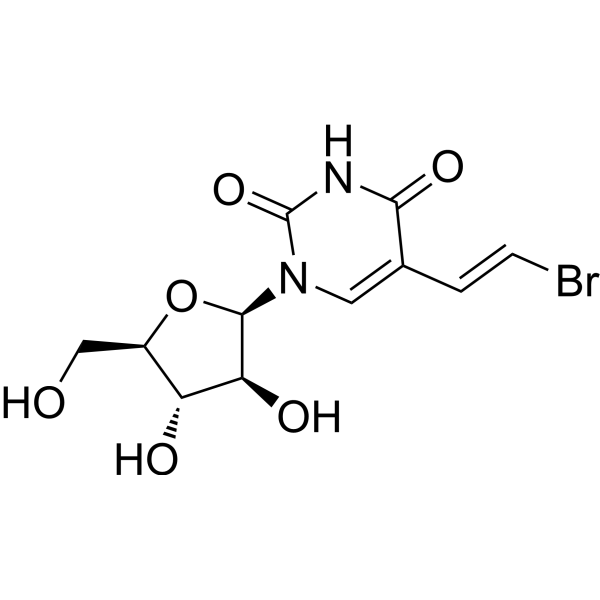
-
- HY-101634A
-
|
|
HCV
|
Infection
|
|
ABT-072 (potassium trihydrate) is an orally active and potent non-nucleoside HCV NS5B polymerase inhibitor (HCV GT1a EC50=1 nM; HCV GT1b EC50=0.3 nM) .
|
-
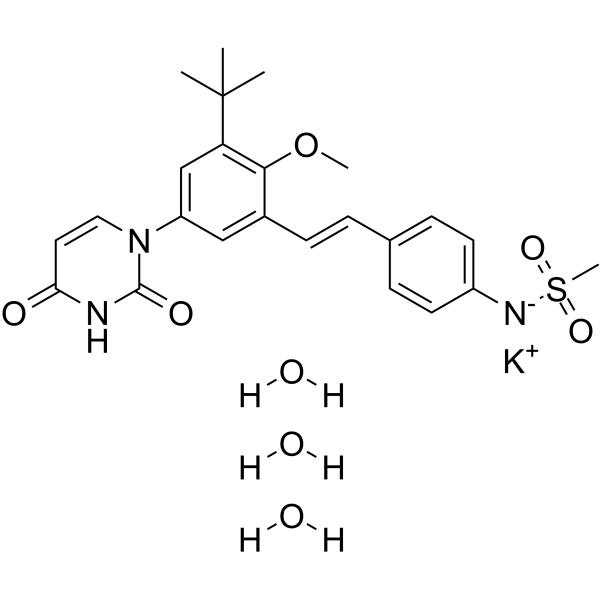
-
- HY-B0250A
-
|
BCH-189 salicylate
|
HIV
Reverse Transcriptase
HBV
|
Infection
|
|
Lamivudine (BCH-189) salicylate is an orally active nucleoside reverse transcriptase inhibitor (NRTI). Lamivudine salicylate can inhibit HIV reverse transcriptase 1/2 and also the reverse transcriptase of hepatitis B virus. Lamivudine salicylate can penetrate the CNS .
|
-
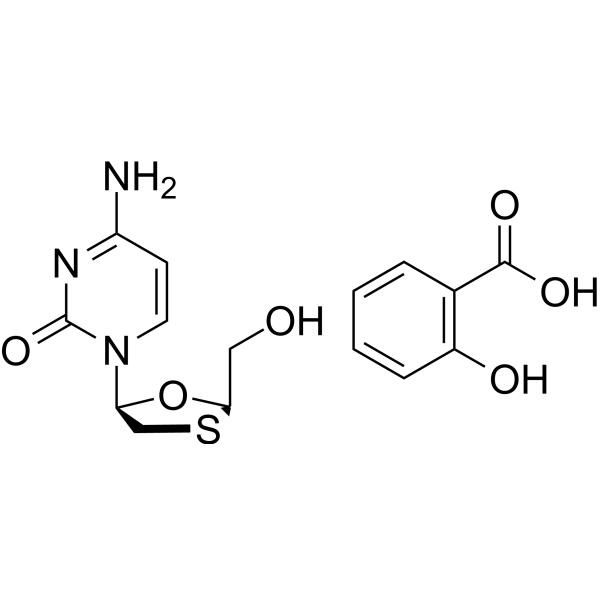
-
- HY-17026E
-
|
dFdCTP trisodium
|
Endogenous Metabolite
|
Cancer
|
|
Gemcitabine triphosphate (trisodium) is one of the two nucleoside metabolites of Gemcitabine (HY-17026) in cells. The other is active diphosphate (dFdDTP). Gemcitabine triphosphate can be used as a standard in radio-labeled probe imaging studies, to identify tumors sensitive to Gemcitabine, and to evaluate Gemcitabine uptake and retention by cells .
|
-
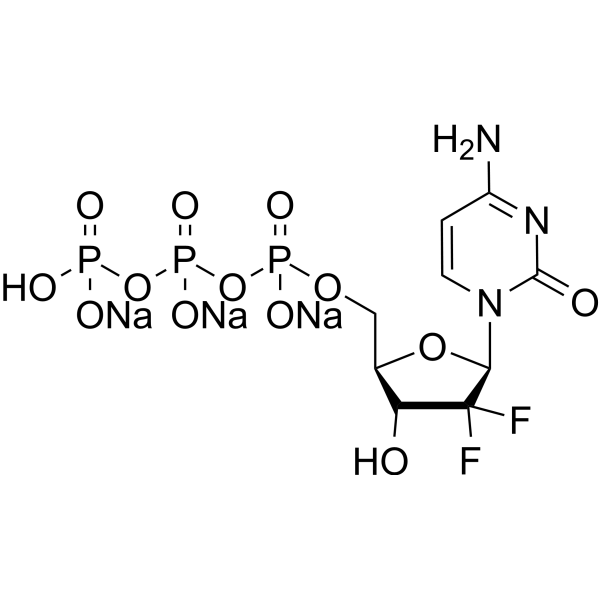
-
- HY-147764
-
|
|
HCV
|
Infection
|
|
HCV-IN-40 (Compound 18c) is a potent, orally active hepatitis C virus (HCV) nucleoside inhibitor with EC50 values of 0.259, 0.434 and 0.069 μM against GT1a, GT1b and GT1b CES1 replicons .
|
-
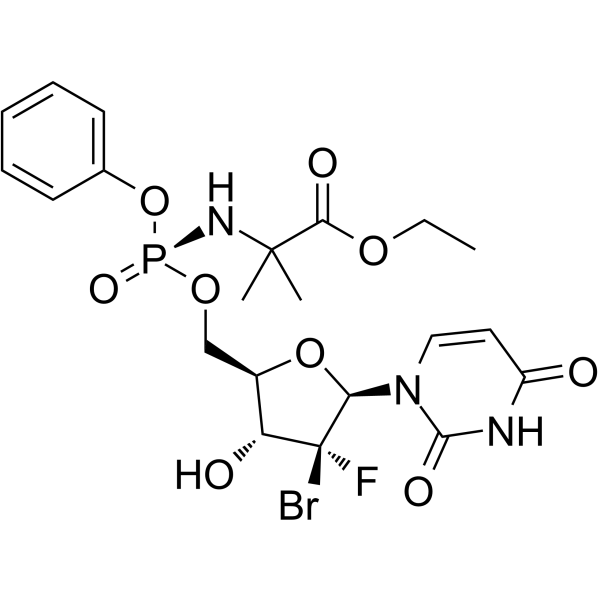
-
- HY-17423B
-
|
|
HIV
Reverse Transcriptase
Telomerase
Apoptosis
|
Infection
Cancer
|
|
Abacavir monosulfate is a competitive, orally active nucleoside reverse transcriptase inhibitor. Abacavir monosulfate can inhibits the replication of HIV. Abacavir monosulfate shows anticancer activity in prostate cancer cell lines. Abacavir monosulfate can trespass the blood-brain-barrier and suppresses telomerase activity .
|
-
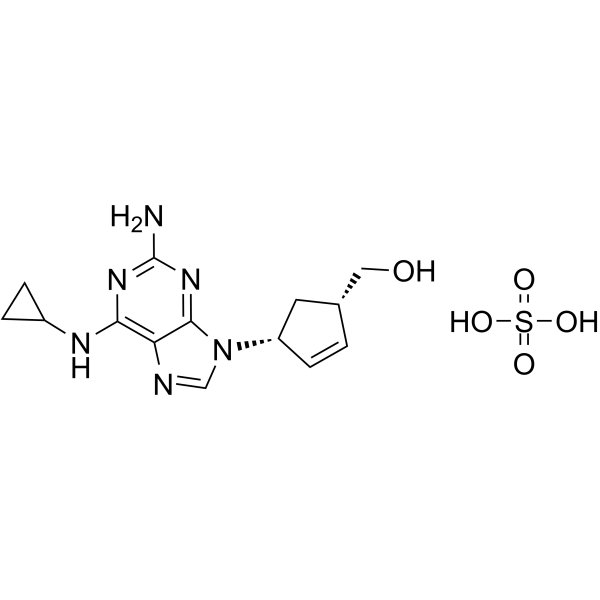
-
- HY-17026A
-
|
dFdCTP
|
Drug Metabolite
Endogenous Metabolite
|
Cancer
|
|
Gemcitabine triphosphate (dFdCTP) is one of the two nucleoside metabolites of Gemcitabine (HY-17026) in cells. The other is active diphosphate (dFdDTP). Gemcitabine triphosphate can be used as a standard in radio-labeled probe imaging studies, to identify tumors sensitive to Gemcitabine, and to evaluate Gemcitabine uptake and retention by cells .
|
-
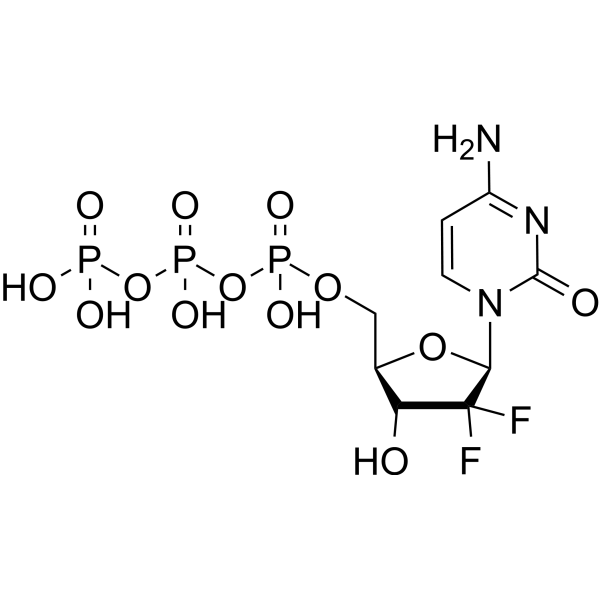
-
- HY-13642
-
|
N-Phthalyl-L-tryptophan
|
DNA Methyltransferase
|
Cancer
|
|
RG108 (N-Phthalyl-L-tryptophan) is a non-nucleoside DNA methyltransferases (DNMTs) inhibitor (IC50=115 nM) that blocks the DNMTs active site. RG108 (N-Phthalyl-L-tryptophan) causes demethylation and reactivation of tumor suppressor genes, but it does not affect the methylation of centromeric satellite sequences .
|
-
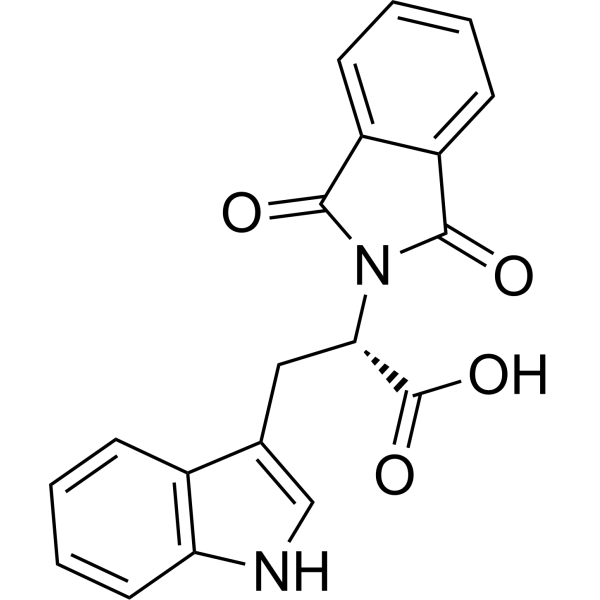
-
- HY-17423A
-
|
Abacavir Hemisulfate; ABC sulfate
|
Reverse Transcriptase
HIV
Telomerase
Apoptosis
|
Infection
|
|
Abacavir sulfate (Abacavir Hemisulfate) is a competitive, orally active nucleoside reverse transcriptase inhibitor. Abacavir sulfate can inhibits the replication of HIV. Abacavir sulfate shows anticancer activity in prostate cancer cell lines. Abacavir sulfate can trespass the blood-brain-barrier and suppresses telomerase activity .
|
-
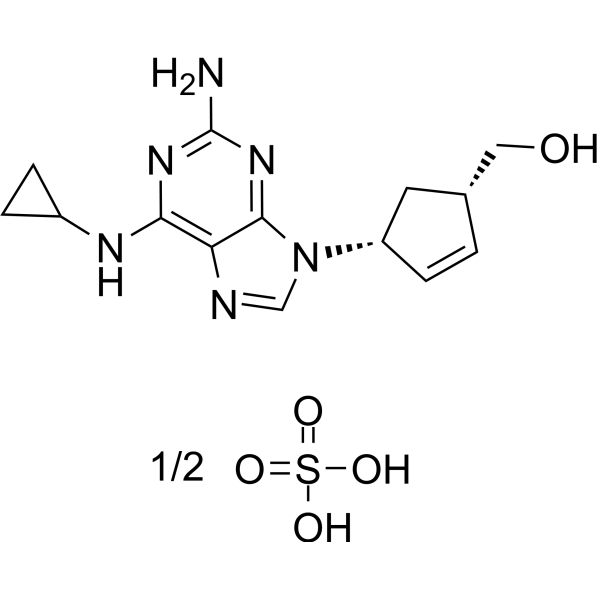
-
- HY-13859
-
|
L-FMAU
|
HBV
DNA/RNA Synthesis
Orthopoxvirus
|
Infection
|
|
Clevudine (L-FMAU), a nucleoside analog of the unnatural L-configuration, has potent anti-HBV activity with long half-life, low toxicity. Clevudine is a non-competitive inhibitor that is not incorporated into the viral DNA but rather binds to the polymerase. Clevudine is active against cowpox virus respiratory infection in mice .
|
-
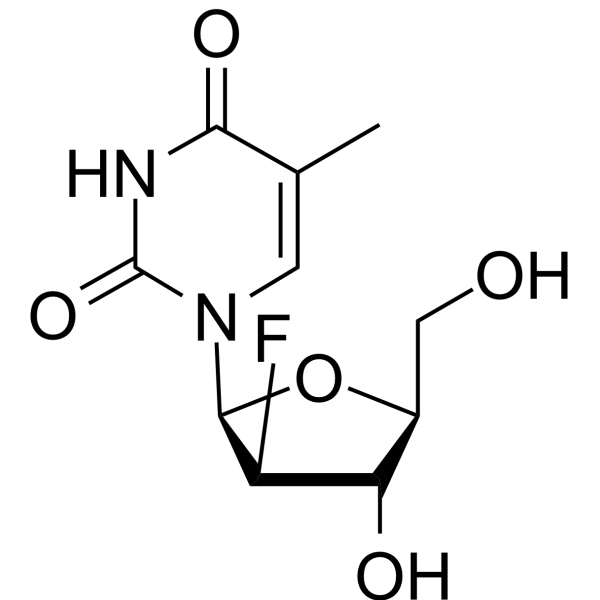
-
- HY-B0250R
-
|
BCH-189 (Standard)
|
HIV
Reverse Transcriptase
HBV
|
Infection
Cancer
|
|
Lamivudine (Standard) is the analytical standard of Lamivudine. This product is intended for research and analytical applications. Lamivudine (BCH-189) is an orally active nucleoside reverse transcriptase inhibitor (NRTI). Lamivudine can inhibit HIV reverse transcriptase 1/2 and also the reverse transcriptase of hepatitis B virus. Lamivudine salicylate can penetrate the CNS .
|
-
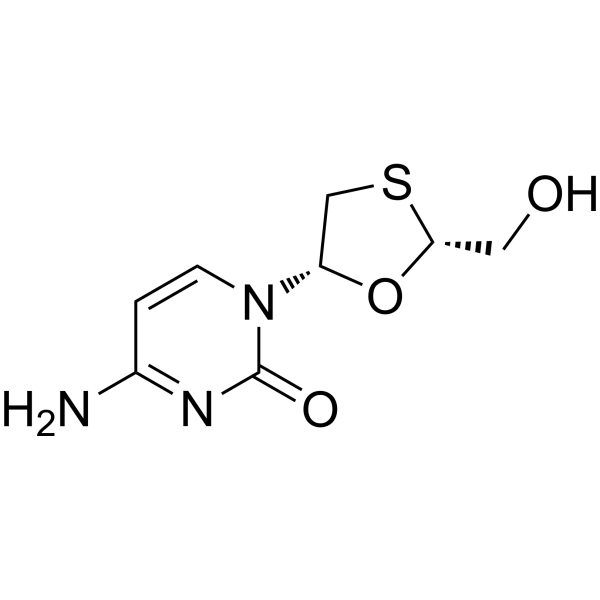
-
- HY-B0116
-
-
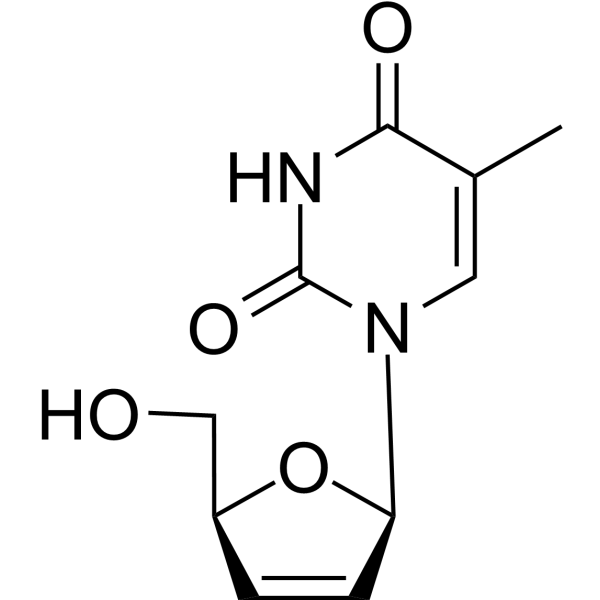
-
- HY-B0116A
-
-
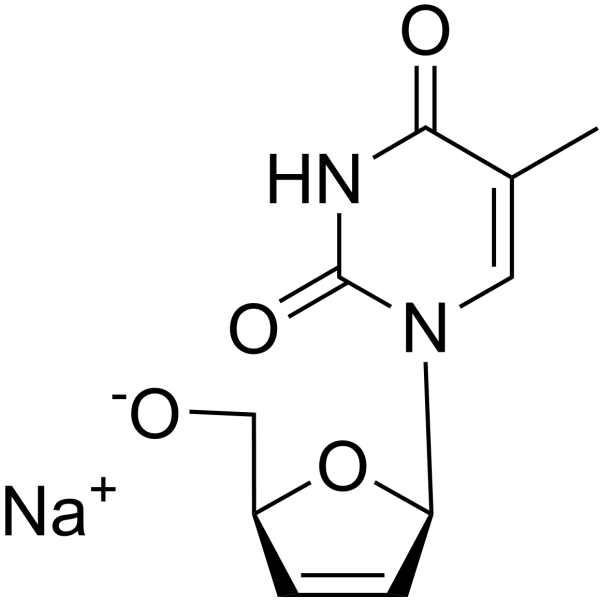
-
- HY-16209
-
|
BCX-1777 hydrochloride; Immucillin-H hydrochloride
|
Nucleoside Antimetabolite/Analog
Apoptosis
|
Cancer
|
|
Forodesine hydrochloride (BCX-1777 hydrochloride) is a highly potent and orally active purine nucleoside phosphorylase (PNP) inhibitor with IC50 values ranging from 0.48 to 1.57 nM for human, mouse, rat, monkey and dog PNP. Forodesine hydrochloride is a potent human lymphocyte proliferation inhibitor. Forodesine hydrochloride could induce apoptosis in leukemic cells by increasing the dGTP levels .
|
-
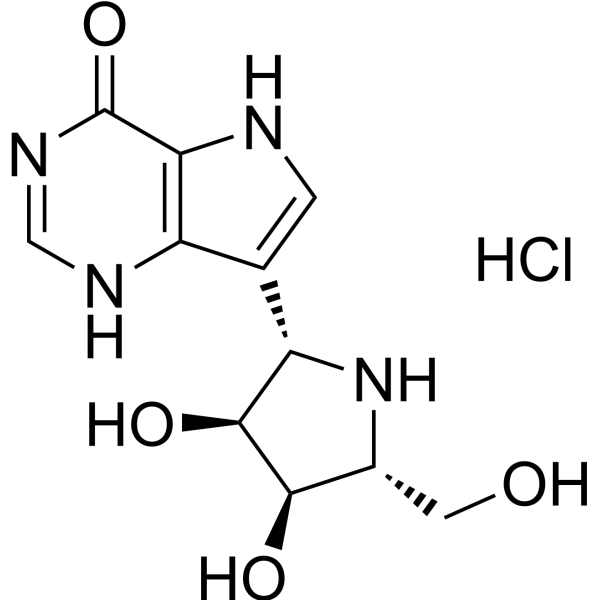
-
- HY-16210
-
|
BCX-1777; Immucillin-H
|
Nucleoside Antimetabolite/Analog
Apoptosis
|
Cancer
|
|
Forodesine (BCX-1777) is a highly potent and orally active purine nucleoside phosphorylase (PNP) inhibitor with IC50 values ranging from 0.48 to 1.57 nM for human, mouse, rat, monkey and dog PNP. Forodesine is a potent human lymphocyte proliferation inhibitor. Forodesine could induce apoptosis in leukemic cells by increasing the dGTP levels .
|
-
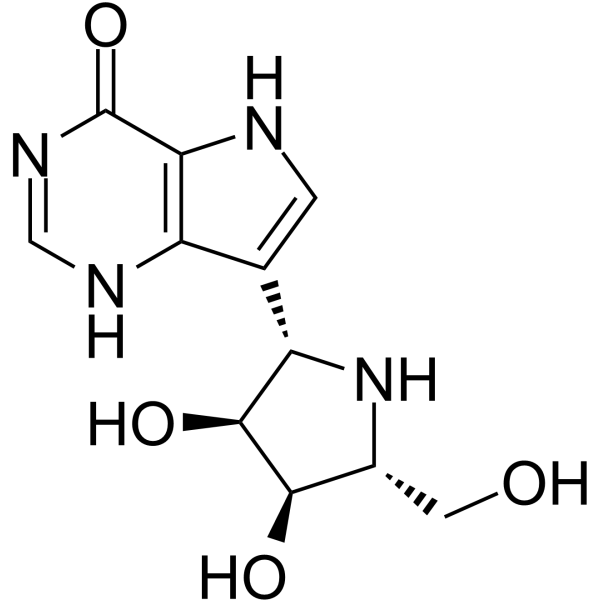
-
- HY-13599
-
|
2-Chloro-2′-deoxyadenosine; CldAdo; 2CdA
|
Adenosine Deaminase
Apoptosis
|
Cardiovascular Disease
Cancer
|
|
Cladribine (2-Chloro-2′-deoxyadenosine), a purine nucleoside analog, is an orally active adenosine deaminase inhibitor. Cladribine functions as an inhibitor of DNA synthesis to block the repair of the damaged DNA. Cladribine can inhibit DNA methylation. Cladribine has anti-lymphoma activity. Cladribine can be used for the research of several hematologic malignancies and multiple sclerosis .
|
-
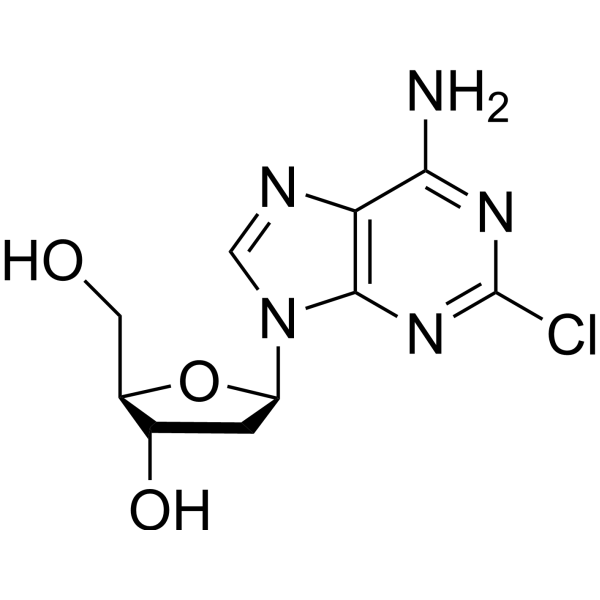
-
- HY-14920
-
|
Reverset; d-d4FC
|
Reverse Transcriptase
HIV
|
Infection
|
|
Dexelvucitabine (Reverset; d-d4FC), a Cytidine (HY-B0158) analog, is an orally active nucleoside reverse transcriptase inhibitor. Dexelvucitabine is a powerful agent against HIV-1-resistant viruses containing a thymidine analog and/or M184V mutation in the viral polymerase. Dexelvucitabine is a 2′-Deoxycytidine antiretroviral agent .
|
-
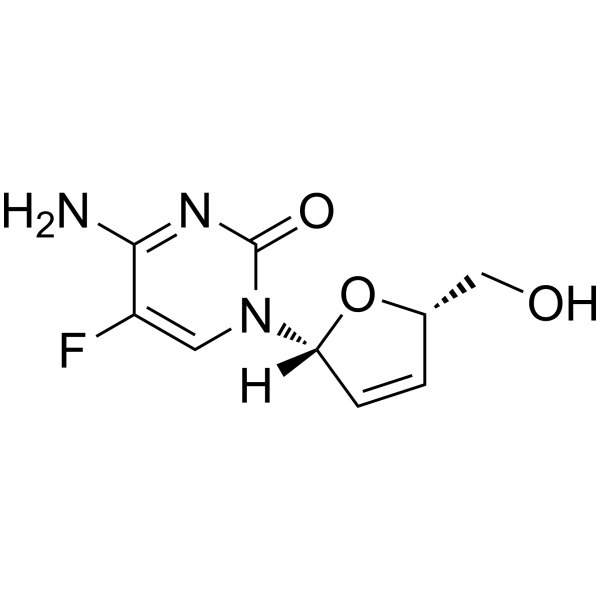
-
- HY-148191
-
|
|
HIV Protease
|
Infection
Cardiovascular Disease
Inflammation/Immunology
Cancer
|
|
CL-197 is an orally active and long-acting purine anti-HIV nucleoside reverse transcriptase inhibitor (NRTI). CL-197 has potential effect on the research of viral, oncological and cerebrovascular diseases . CL-197 is a click chemistry reagent, it contains an Alkyne group and can undergo copper-catalyzed azide-alkyne cycloaddition (CuAAc) with molecules containing Azide groups.
|
-
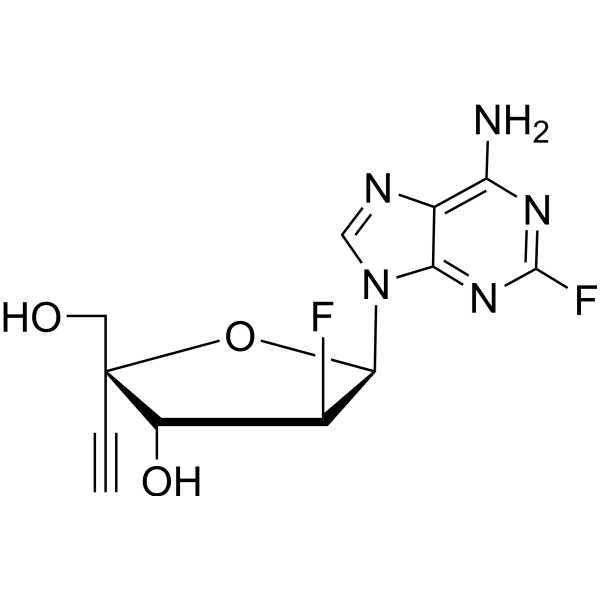
-
- HY-B0250S
-
|
BCH-189-15N,d2
|
HBV
HIV
Reverse Transcriptase
Isotope-Labeled Compounds
|
Infection
Cancer
|
|
Lamivudine- 15N,d2 is 15N and deuterated labeled Lamivudine (HY-B0250). Lamivudine (BCH-189) is an orally active nucleoside reverse transcriptase inhibitor (NRTI). Lamivudine can inhibit HIV reverse transcriptase 1/2 and also the reverse transcriptase of hepatitis B virus. Lamivudine salicylate can penetrate the CNS .
|
-
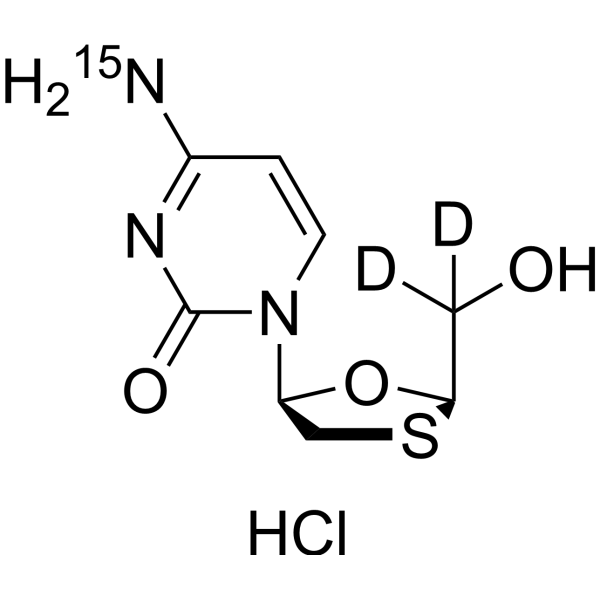
-
- HY-106934
-
|
BCX 34
|
Nucleoside Antimetabolite/Analog
HIV
|
Infection
Inflammation/Immunology
Cancer
|
|
Peldesine (BCX 34) is a potent, competitive, reversible and orally active purine nucleoside phosphorylase (PNP) inhibitor with IC50s of 36 nM, 5 nM, and 32 nM for human, rat, and mouse red blood cell (RBC) PNP, respectively. Peldesine is also a T-cell proliferation inhibitor with an IC50 of 800 nM. Peldesine has the potential for cutaneous T-cell lymphoma, psoriasis and HIV infection research .
|
-
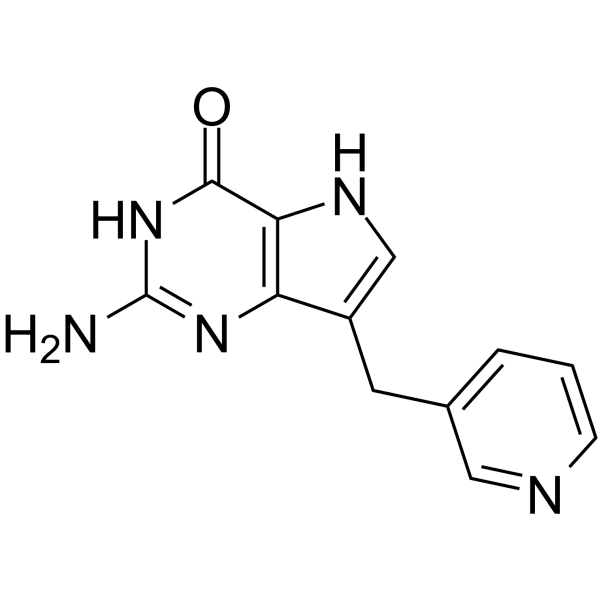
-
- HY-106934A
-
|
BCX 34 dihydrochloride
|
Nucleoside Antimetabolite/Analog
HIV
|
Infection
Inflammation/Immunology
Cancer
|
|
Peldesine (BCX 34) dihydrochloride is a potent, competitive, reversible and orally active purine nucleoside phosphorylase (PNP) inhibitor with IC50s of 36 nM, 5 nM, and 32 nM for human, rat, and mouse red blood cell (RBC) PNP, respectively. Peldesine dihydrochloride is also a T-cell proliferation inhibitor with an IC50 of 800 nM. Peldesine dihydrochloride has the potential for cutaneous T-cell lymphoma, psoriasis and HIV infection research .
|
-
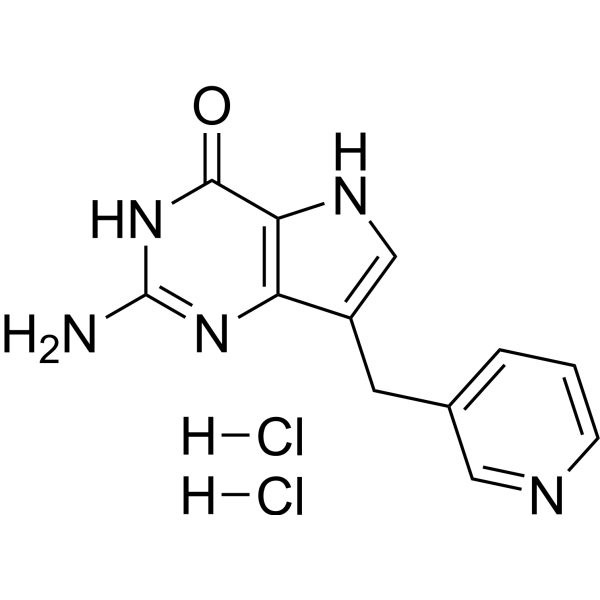
-
- HY-144112
-
|
|
HIV
|
Infection
|
|
HIV-1 inhibitor-13 (compound 16c) is a orally active and potent HIV-1 non-nucleoside reverse transcriptase inhibitor (NNRTI), with IC50 of 0.14 μM (HIV-1 RT). HIV-1 inhibitor-13 shows activity against a panel of HIV-1 resistant strains, with EC50 values of 2.85-18.0 nM .
|
-
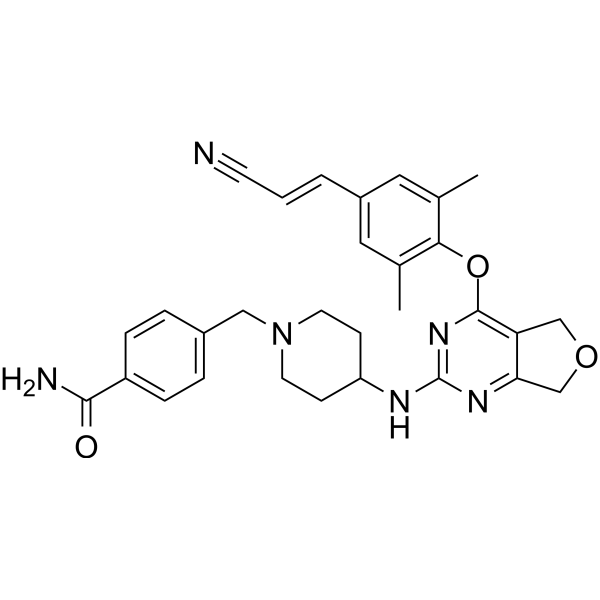
-
- HY-147841
-
|
|
HIV
Reverse Transcriptase
|
Infection
|
|
HIV-1 inhibitor-41 (Compound B23) is an orally active non-nucleoside HIV-1 reverse transcriptase inhibitor with EC50 values of 20.8 nM and 50 nM against HIV-1 WT and mutant E138K strain, respectively. HIV-1 inhibitor-41 shows low hERG, no apparent CYP enzymatic inhibition and no acute toxicity .
|
-
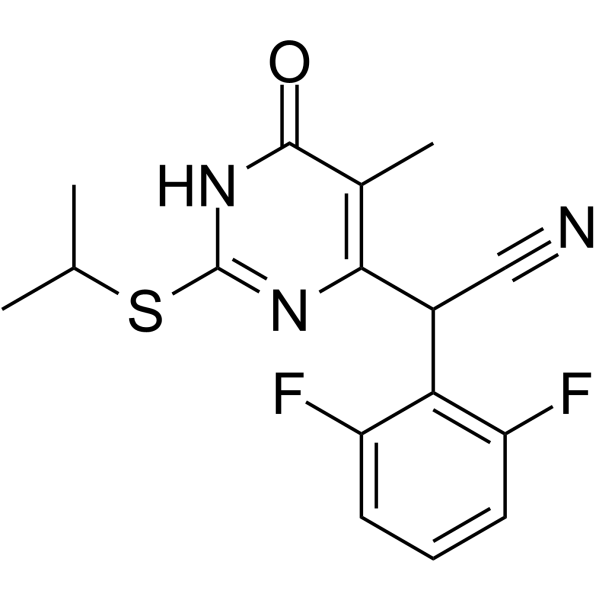
-
- HY-151933
-
|
|
HIV
Reverse Transcriptase
|
Infection
|
|
HIV-1 inhibitor-49 is an orally active HIV-1 inhibitor, is a HEPT analog. HIV-1 inhibitor-49 possesses great pharmacokinetics profiles and potent non-nucleoside reverse transcriptase inhibitory activity (IC50=30 nM). HIV-1 inhibitor-49 exerts potential safety without acute toxicity in mouse model .
|
-
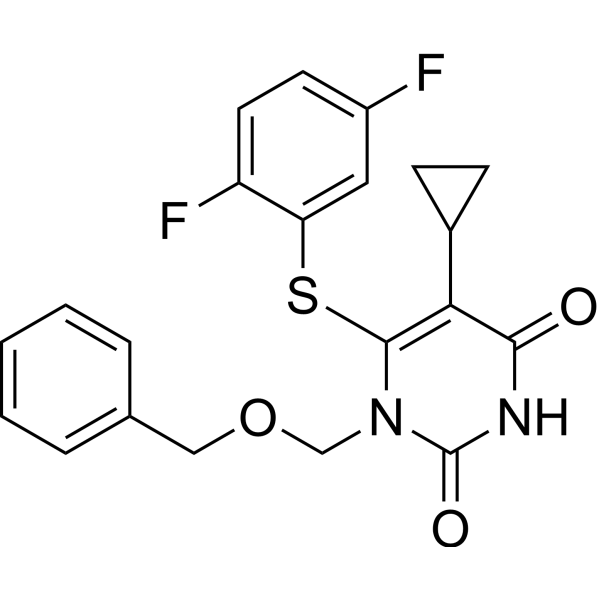
-
- HY-B0116S
-
-
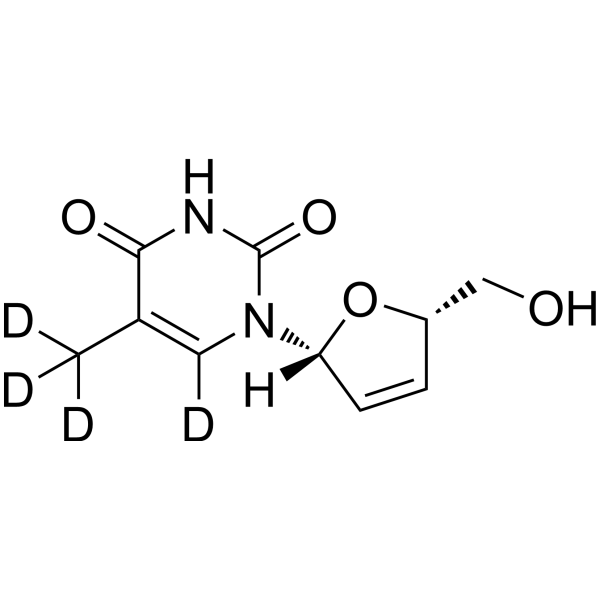
-
- HY-145119AS
-
|
JT001; VV116; GS-621763-d1 hydrobromide
|
SARS-CoV
RSV
Influenza Virus
|
Infection
|
|
Mindeudesivir (JT001; VV116; GS-621763-d1) hydrobromide is a deuterated version of Remdesivir (HY-104077), a highly orally active nucleoside antiviral against SARS-CoV-2 and respiratory syncytial virus (RSV). Mindeudesivir hydrobromide retains the antiviral activity of Remdesivir against COVID-19, and is the first domestically produced deuterium targeting the COVID-19 .
|
-
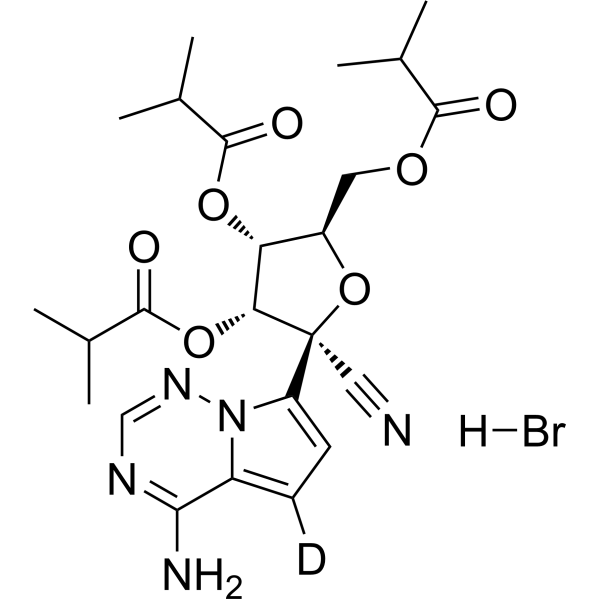
-
- HY-16478
-
|
TAS-102; FTD/TPI
|
Nucleoside Antimetabolite/Analog
Thymidylate Synthase
|
Cancer
|
|
Trifluridine/tipiracil hydrochloride mixture (TAS-102) is a potent and orally active nucleoside antitumor agent. The composition of Trifluridine/tipiracil hydrochloride mixture (TAS-102) is a 1:0.5 mixture (on a molar basis) of alpha,alpha,alpha-tri-fluorothymidine (FTD) and thymidine phosphorylase inhibitor (TPI). Trifluridine/tipiracil hydrochloride mixture (TAS-102) shows the antitumor activity mainly via the inhibition of thymidylate synthase (TS) and incorporation into DNA .
|
-
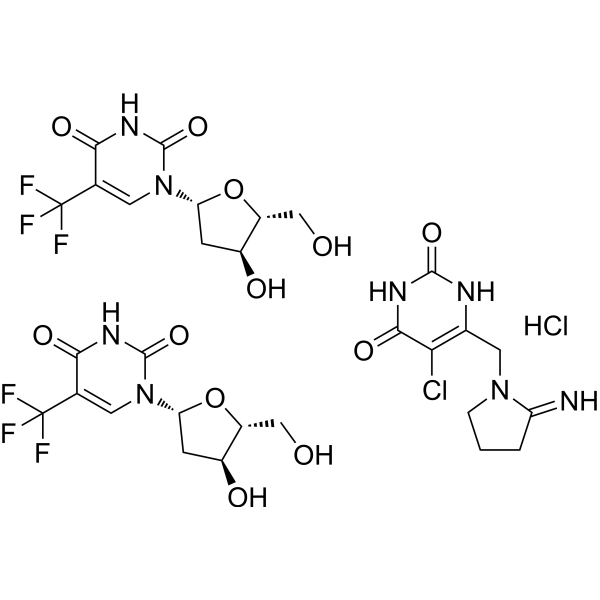
-
- HY-122502
-
|
|
DNA/RNA Synthesis
|
Cancer
|
|
Pyrazofurin, a pyrimidine nucleoside analogue with antineoplastic activity, inhibits cell proliferation and DNA synthesis in cells by inhibiting uridine 5'-phosphate (UMP) synthase . Pyrazofurin is an active, sensitive orotate-phosphoribosyltransferase inhibitor with IC50s between 0.06-0.37 µM in the three squamous cell carcinoma (SCC) cell lines Hep-2, HNSCC-14B and HNSCC-14C .
|
-
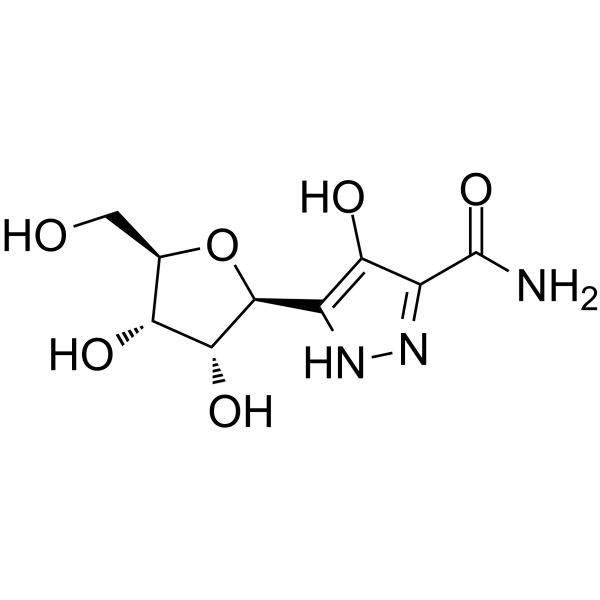
- HY-139262
-
|
|
Reverse Transcriptase
HIV
HBV
HCV
|
Infection
|
|
FNC-TP is the intracellular active form of FNC. FNC is a potent nucleoside reverse transcriptase inhibitor (NRTI), with antiviral activity on HIV, HBV and HCV . FNC-TP is a click chemistry reagent, it contains an Azide group and can undergo copper-catalyzed azide-alkyne cycloaddition reaction (CuAAc) with molecules containing Alkyne groups. Strain-promoted alkyne-azide cycloaddition (SPAAC) can also occur with molecules containing DBCO or BCN groups.
|
-
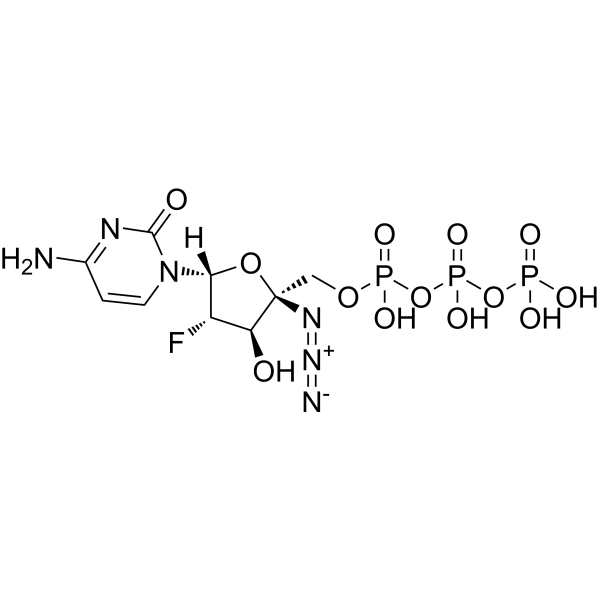
- HY-10571
-
|
U 90152; BHAP-U 90152
|
HIV
Reverse Transcriptase
|
Infection
|
|
Delavirdine (U 90152) is a potent, highly specific and orally active non-nucleoside reverse transcriptase inhibitor (NNRTI). Delavirdine selectively inhibits HIV-1 reverse transcriptase (RT) (IC50=0.26 μM) over DNA polymerase α (IC50=440 μM) and polymerase δ (IC50>550 μM). Delavirdine is an inhibitor of HIV-1 replication and can can be used for the study of AIDs .
|
-
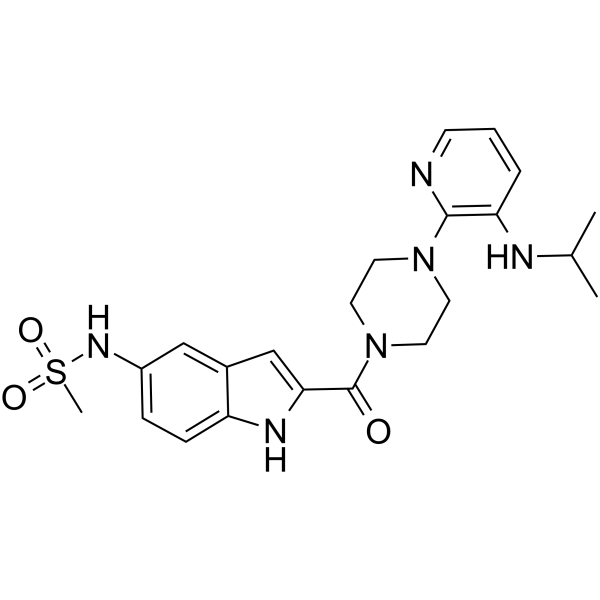
- HY-10571A
-
|
U 90152 mesylate; BHAP-U 90152 mesylate
|
HIV
Reverse Transcriptase
|
Infection
|
|
Delavirdine (U 90152) mesylate is a potent, highly specific and orally active non-nucleoside reverse transcriptase inhibitor (NNRTI). Delavirdine mesylate selectively inhibits HIV-1 reverse transcriptase (RT) (IC50=0.26 μM) over DNA polymerase α (IC50=440 μM) and polymerase δ (IC50>550 μM). Delavirdine mesylate is an inhibitor of HIV-1 replication and can can be used for the study of AIDs .
|
-
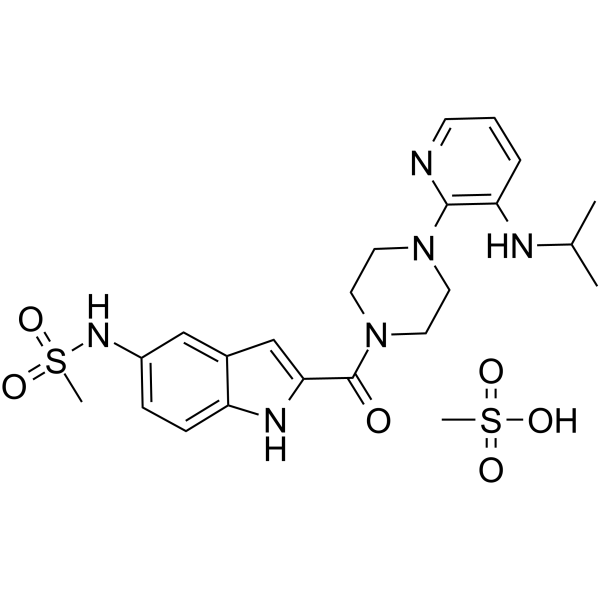
- HY-10118
-
|
|
HCV
DNA/RNA Synthesis
|
Infection
|
|
Filibuvir is an orally active, selective non-nucleoside inhibitor of the HCV nonstructural 5B protein (NS5B) RNA-dependent RNA polymerase (RdRp). Filibuvir binds noncovalently in the thumb II allosteric pocket of NS5B. Filibuvir inhibits genotype 1a and 1b replicons with EC50s of 59 nM for both isoforms, respectively . Filibuvir preferentially inhibits elongative RNA synthesis and potently decreases viral RNA accumulation .
|
-
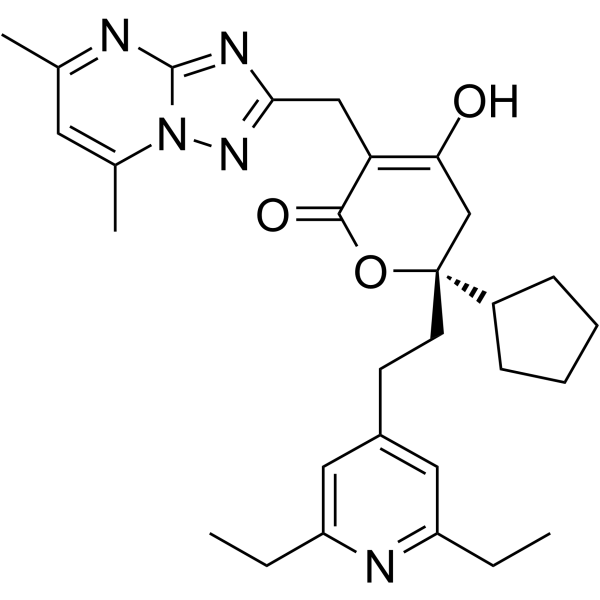
- HY-139262A
-
|
|
Reverse Transcriptase
HIV
HBV
HCV
|
Infection
|
|
FNC-TP trisodium is the intracellular active form of FNC. FNC is a potent nucleoside reverse transcriptase inhibitor (NRTI), with antiviral activity on HIV, HBV and HCV . FNC-TP (trisodium) is a click chemistry reagent, it contains an Azide group and can undergo copper-catalyzed azide-alkyne cycloaddition reaction (CuAAc) with molecules containing Alkyne groups. Strain-promoted alkyne-azide cycloaddition (SPAAC) can also occur with molecules containing DBCO or BCN groups.
|
-
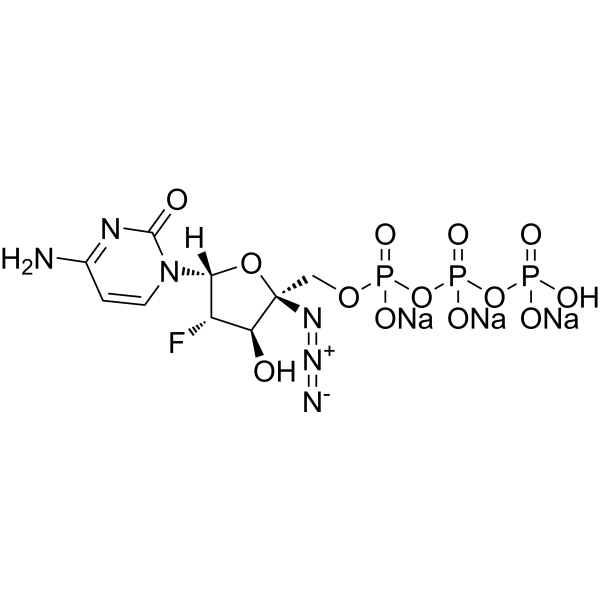
- HY-132291
-
|
|
HIV
|
Infection
|
|
HIV-1 inhibitor-8 is an orally active, low-toxicity and potent HIV‑1 non-nucleoside reverse transcriptase inhibitor (NNRTI). HIV-1 inhibitor-8 yields exceptionally potent antiviral activities (EC50=4.44~54.5 nM) against various HIV‑1 strains. The IC50 of HIV-1 inhibitor-8 against WT HIV-1 reverse transcriptase is 0.081 μM .
|
-
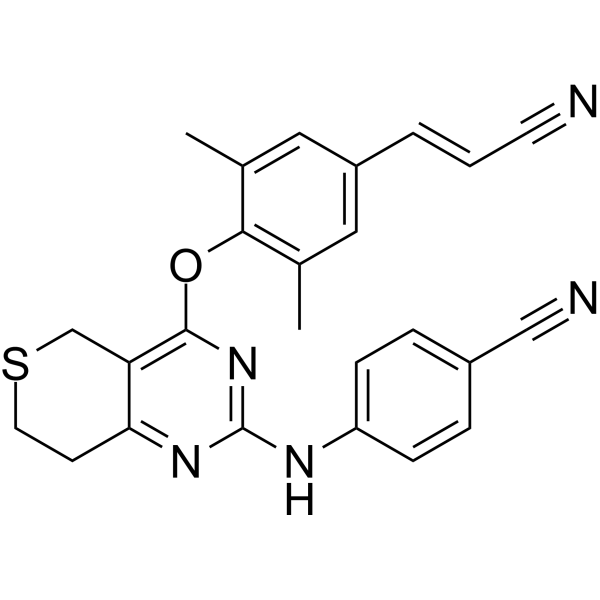
- HY-10443
-
|
Ro 4588161; R1626
|
HCV
DNA/RNA Synthesis
|
Infection
|
|
Balapiravir (Ro 4588161; R1626) is an orally active proagent of a nucleoside analogue inhibitor of the RNA-dependent RNA polymerase (RdRp) of HCV (R1479; 4'-Azidocytidine). Balapiravir has anti-HCV activity . Balapiravir is a click chemistry reagent, it contains an Azide group and can undergo copper-catalyzed azide-alkyne cycloaddition reaction (CuAAc) with molecules containing Alkyne groups. Strain-promoted alkyne-azide cycloaddition (SPAAC) can also occur with molecules containing DBCO or BCN groups.
|
-
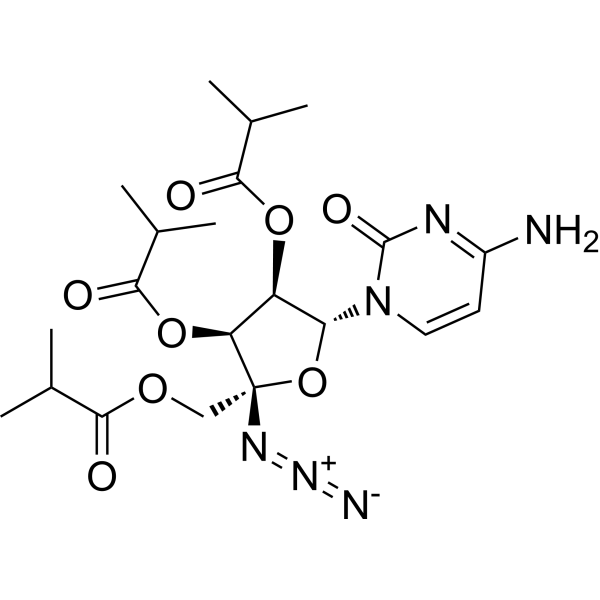
- HY-13637
-
Ganciclovir
Maximum Cited Publications
14 Publications Verification
BW 759; 2'-Nor-2'-deoxyguanosine
|
CMV
HSV
Antibiotic
Nucleoside Antimetabolite/Analog
|
Infection
Cancer
|
|
Ganciclovir (BW 759), a nucleoside analogue, is an orally active antiviral agent with activity against CMV. Ganciclovir also has activity in vitro against members of the herpes group and some other DNA viruses. Ganciclovir inhibits the in vitro replication of human herpes viruses (HSV 1 and 2, CMV) and adenovirus serotypes 1, 2, 4, 6, 8, 10, 19, 22 and 28. Ganciclovir has an IC50 of 5.2 μM for feline herpesvirus type-1 (FHV-1) and can diffuse into the brain .
|
-
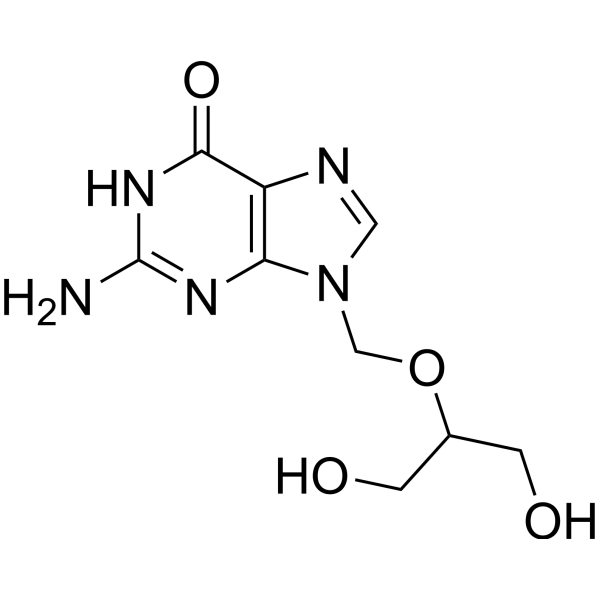
- HY-10443A
-
|
Ro 4588161 hydrochloride; R1626 hydrochloride
|
HCV
DNA/RNA Synthesis
|
Infection
|
|
Balapiravir hydrochloride (Ro 4588161 hydrochloride; R1626 hydrochloride) is an orally active proagent of a nucleoside analogue inhibitor of the RNA-dependent RNA polymerase (RdRp) of HCV (R1479; 4'-Azidocytidine). Balapiravir hydrochloride has anti-HCV activity . Balapiravir (hydrochloride) is a click chemistry reagent, it contains an Azide group and can undergo copper-catalyzed azide-alkyne cycloaddition reaction (CuAAc) with molecules containing Alkyne groups. Strain-promoted alkyne-azide cycloaddition (SPAAC) can also occur with molecules containing DBCO or BCN groups.
|
-
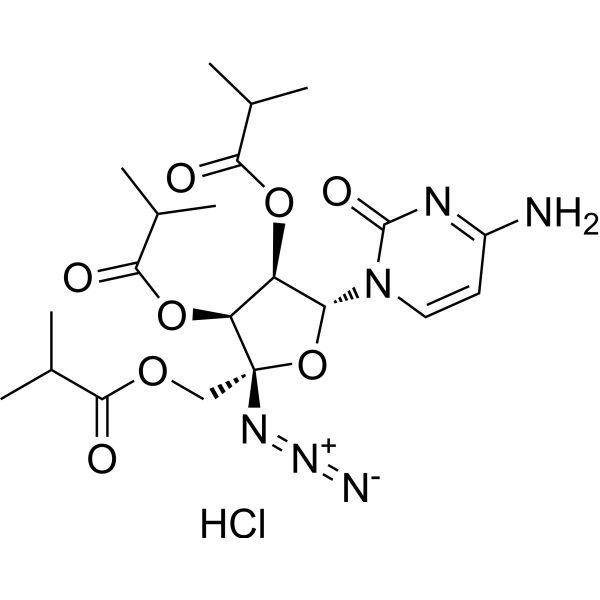
- HY-13637A
-
|
BW 759 sodium; 2'-Nor-2'-deoxyguanosine sodium
|
|
|
|
Ganciclovir (BW 759) sodium, a nucleoside analogue, is an orally active antiviral agent with activity against CMV. Ganciclovir sodium also has activity in vitro against members of the herpes group and some other DNA viruses. Ganciclovir sodium inhibits the in vitro replication of human herpes viruses (HSV 1 and 2, CMV) and adenovirus serotypes 1, 2, 4, 6, 8, 10, 19, 22 and 28. Ganciclovir sodium has an IC50 of 5.2 μM for feline herpesvirus type-1 (FHV-1) and can diffuse into the brain .
|
-
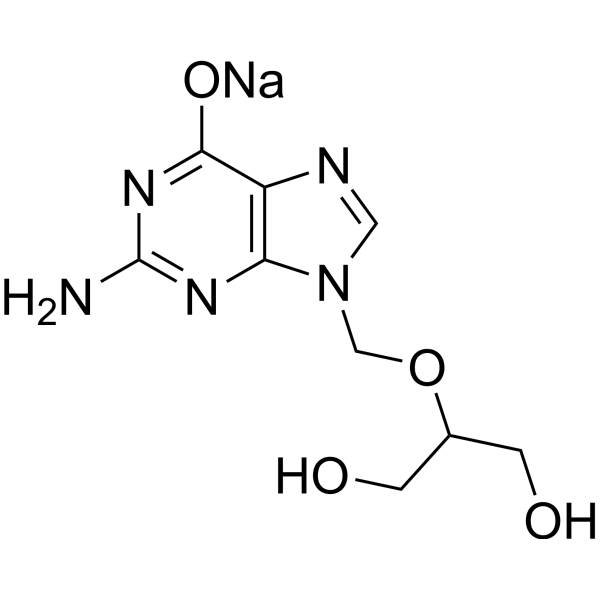
- HY-149005
-
|
|
Histone Methyltransferase
|
Cancer
|
|
PRMT5-IN-19 (Compound 41) is an selective orally active non-nucleoside PRMT5 inhibitor with IC50 values of 23.9 nM (radioactive biochemical assay) and 47 nM (AlphaLISA assay). PRMT5-IN-19 can occupy the SAM-binding pocket in PRMT5 and block methyltransferase activity, which displays good selectivity over other PRMTs and PKMTs. PRMT5-IN-19 inhibits cell proliferation by inducing cell apoptosis, and can be used for cancer-related research .
|
-
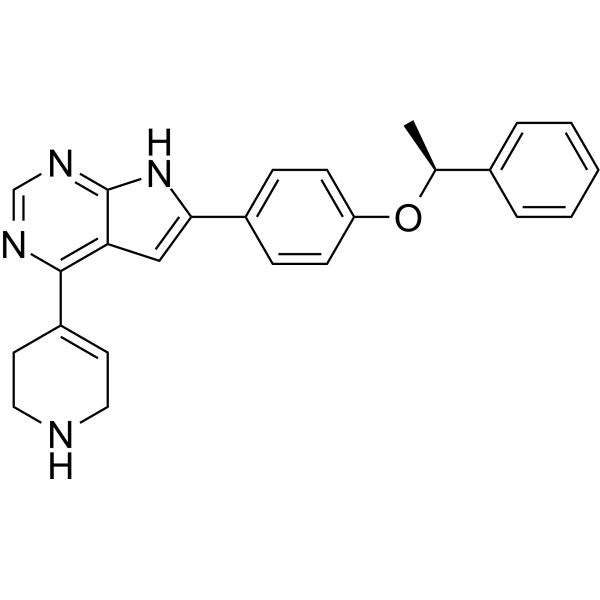
- HY-13637B
-
|
BW-759 hydrate; 2'-Nor-2'-deoxyguanosine hydrate
|
CMV
HSV
Antibiotic
Nucleoside Antimetabolite/Analog
|
Infection
Cancer
|
|
Ganciclovir (BW 759) hydrate, a nucleoside analogue, is an orally active antiviral agent with activity against CMV. Ganciclovir hydrate also has activity in vitro against members of the herpes group and some other DNA viruses. Ganciclovir hydrate inhibits the in vitro replication of human herpes viruses (HSV 1 and 2, CMV) and adenovirus serotypes 1, 2, 4, 6, 8, 10, 19, 22 and 28. Ganciclovir hydrate has an IC50 of 5.2 μM for feline herpesvirus type-1 (FHV-1) and can diffuse into the brain .
|
-
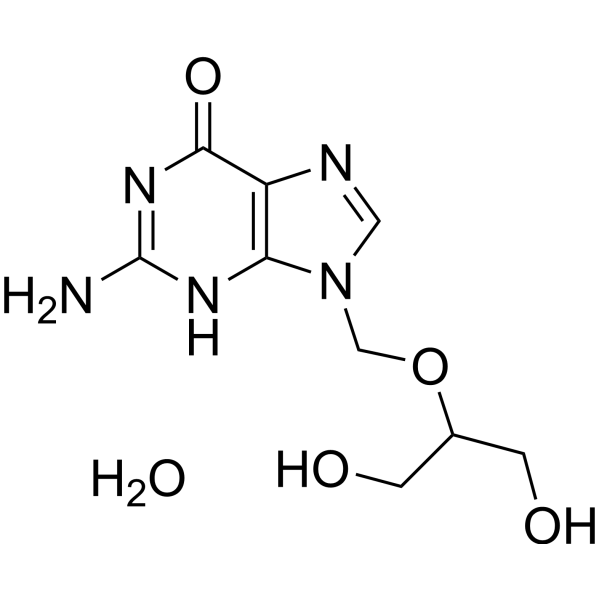
- HY-13637S
-
|
BW 759-d5; 2'-Nor-2'-deoxyguanosine-d5
|
Isotope-Labeled Compounds
CMV
HSV
Antibiotic
Nucleoside Antimetabolite/Analog
|
Infection
|
|
Ganciclovir-d5 is the deuterium labeled Ganciclovir. Ganciclovir (BW 759), a nucleoside analogue, is an orally active antiviral agent with activity against CMV. Ganciclovir also has activity in vitro against members of the herpes group and some other DNA viruses. Ganciclovir inhibits the in vitro replication of human herpes viruses (HSV 1 and 2, CMV) and adenovirus serotypes 1, 2, 4, 6, 8, 10, 19, 22 and 28. Ganciclovir has an IC50 of 5.2 μM for feline herpesvirus type-1 (FHV-1)[1][2][3].
|
-
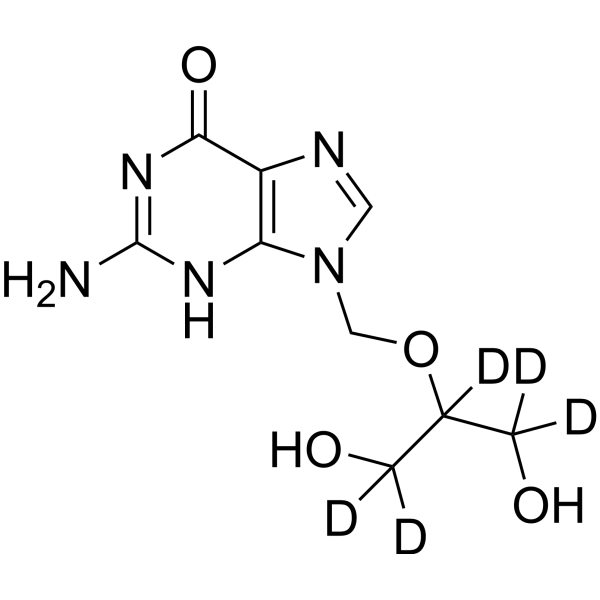
- HY-B0250S1
-
|
BCH-189-13C,15N2,d2
|
Isotope-Labeled Compounds
HBV
Reverse Transcriptase
HIV
|
Infection
|
|
Lamivudine-13C,15N2,d2 (BCH-189-13C,15N2,d2) is a 13C, 15N, and deuterium labeled Lamivudine (HY-B0250). Lamivudine is an orally active and blood-brain barrier permeable nucleoside reverse transcriptase inhibitor (NRTI). Lamivudine inhibits HIV reverse transcriptase 1 and 2 and hepatitis B virus (HBV) reverse transcriptase .
|
-
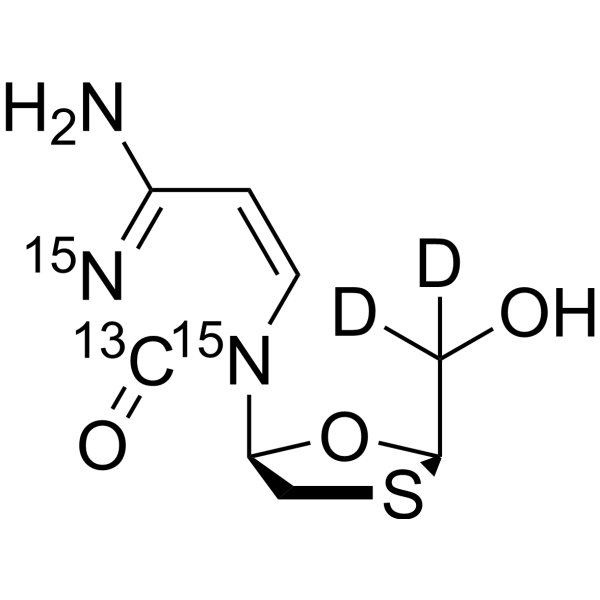
- HY-161356
-
|
|
SARS-CoV
|
Infection
|
|
BPR3P0128 is an orally active, non-nucleoside RNA-dependent RNA polymerase (RdRp) inhibitor that has been shown to inhibit the activity of various SARS-CoV-2 variants. The EC50 for SARS-CoV-2 and HCoV-229E are 0.62 µM and 0.14 µM. BPR3P0128 demonstrates effective anti-pancoronavirus activity within the submicromolar range. PR3P0128 shows synergistic antiviral activity when combined with Remdesivir (HY-104077) .
|
-
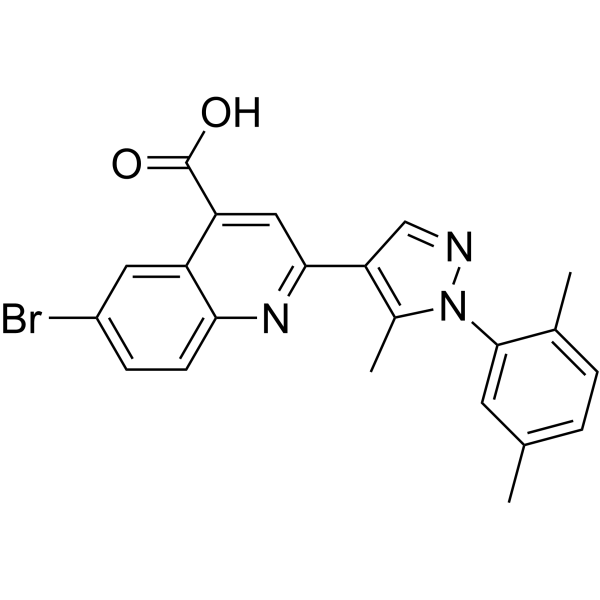
- HY-105268
-
|
CS-92
|
HIV
Reverse Transcriptase
Nucleoside Antimetabolite/Analog
|
Infection
|
|
AzddMeC (CS-92) is an antiviral nucleoside analogue and a potent potent, selective and orally active HIV-1 reverse transcriptase and HIV-1 replication inhibitor. In HIV-1-infected human PBM cells and HIV-1-infected human macrophages, the EC50 values of AzddMeC are 9 nM and 6 nM, respectively . AzddMeC is a click chemistry reagent, it contains an Azide group and can undergo copper-catalyzed azide-alkyne cycloaddition reaction (CuAAc) with molecules containing Alkyne groups. Strain-promoted alkyne-azide cycloaddition (SPAAC) can also occur with molecules containing DBCO or BCN groups.
|
-
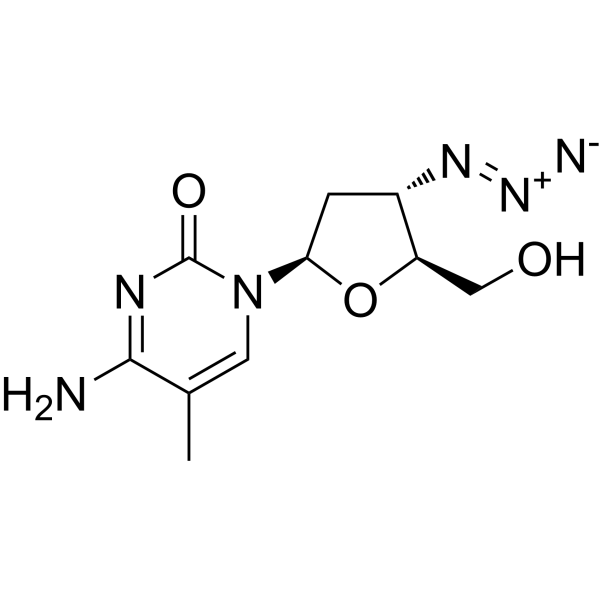
- HY-109014
-
|
CMX-157
|
HIV
HBV
Nucleoside Antimetabolite/Analog
|
Infection
|
|
Tenofovir exalidex (CMX157) is a lipid conjugate of the acyclic nucleotide analog Tenofovir with activity against both wild-type and antiretroviral drug-resistant HIV strains, including multidrug nucleoside/nucleotide analog-resistant viruses. Tenofovir exalidex is active against all major subtypes of HIV-1 and HIV-2 in fresh human PBMCs and against all HIV-1 strains evaluated in monocyte-derived macrophages, with EC50s ranging between 0.2 and 7.2 nM. CMX157 is orally available and has no apparent toxicity. Tenofovir exalidex also shows antiviral activity against HBV .
|
-
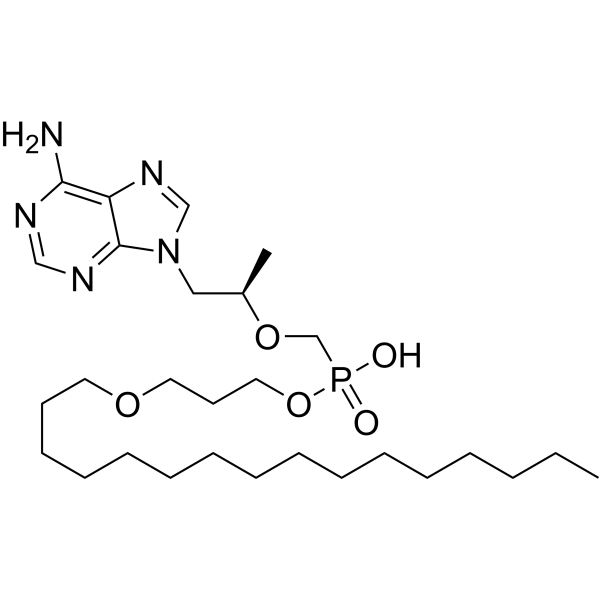
-
-
HY-L127
-
|
|
36 compounds
|
|
Orthopoxvirus is a genus of viruses in the family Poxviridae and subfamily Chordopoxvirinae. The orthopoxvirus genus consists of 12 viruses including variola virus, vaccinia virus (VV), cowpox viruses (CV), monkeypox virus, and camelpox virus. Smallpox has been eradicated worldwide in 1980, but some other orthopoxvirus, such as monkeypox virus, are still threats to human health.
There are not many drugs available for orthopoxvirus treatment. The only product currently available for treatment of complications of Orthopoxvirus infection is vaccinia immunoglobulin (VIG). In 2021, brincidofovir was approved by FDA for the treatment of smallpox and tecovirimat was approved by EMA for the treatment of monkeypox in 2022. A few active compounds including interferon and interferon inducers, and a variety of nucleosides or nucleotides have been reported to have activity against orthopoxvirus.
MCE carefully prepared a unique collection of 36 compounds reported with the anti- orthopoxvirus activity which can be used for drug screening and other research about orthopoxvirus.
|
| Cat. No. |
Product Name |
Category |
Target |
Chemical Structure |
| Cat. No. |
Product Name |
Chemical Structure |
-
- HY-145119AS
-
|
|
|
Mindeudesivir (JT001; VV116; GS-621763-d1) hydrobromide is a deuterated version of Remdesivir (HY-104077), a highly orally active nucleoside antiviral against SARS-CoV-2 and respiratory syncytial virus (RSV). Mindeudesivir hydrobromide retains the antiviral activity of Remdesivir against COVID-19, and is the first domestically produced deuterium targeting the COVID-19 .
|
-

-
- HY-13637S
-
|
|
|
Ganciclovir-d5 is the deuterium labeled Ganciclovir. Ganciclovir (BW 759), a nucleoside analogue, is an orally active antiviral agent with activity against CMV. Ganciclovir also has activity in vitro against members of the herpes group and some other DNA viruses. Ganciclovir inhibits the in vitro replication of human herpes viruses (HSV 1 and 2, CMV) and adenovirus serotypes 1, 2, 4, 6, 8, 10, 19, 22 and 28. Ganciclovir has an IC50 of 5.2 μM for feline herpesvirus type-1 (FHV-1)[1][2][3].
|
-

-
- HY-B0017S
-
|
|
|
Telbivudine-d4 is deuterium labeled Telbivudine. Telbivudine (Epavudine), an orally active thymidine nucleoside analog, is a potent antiviral inhibitor of hepatitis B virus (HBV) replication[1].
|
-

-
- HY-B0250S
-
|
|
|
Lamivudine- 15N,d2 is 15N and deuterated labeled Lamivudine (HY-B0250). Lamivudine (BCH-189) is an orally active nucleoside reverse transcriptase inhibitor (NRTI). Lamivudine can inhibit HIV reverse transcriptase 1/2 and also the reverse transcriptase of hepatitis B virus. Lamivudine salicylate can penetrate the CNS .
|
-

-
- HY-B0116S
-
|
|
|
Stavudine-d4 is the deuterium labeled Stavudine. Stavudine (d4T) is an orally active nucleoside reverse transcriptase inhibitor (NRTI). Stavudine has activity against HIV-1 and HIV-2. Stavudine also inhibits the replication of mitochondrial DNA (mtDNA). Stavudine reduces NLRP3 inflammasome activation and modulates Amyloid-β autophagy. Stavudine induces apoptosis[1][2][3][4].
|
-

-
- HY-B0250S1
-
|
|
|
Lamivudine-13C,15N2,d2 (BCH-189-13C,15N2,d2) is a 13C, 15N, and deuterium labeled Lamivudine (HY-B0250). Lamivudine is an orally active and blood-brain barrier permeable nucleoside reverse transcriptase inhibitor (NRTI). Lamivudine inhibits HIV reverse transcriptase 1 and 2 and hepatitis B virus (HBV) reverse transcriptase .
|
-

| Cat. No. |
Product Name |
|
Classification |
-
- HY-148191
-
|
|
|
Alkynes
|
|
CL-197 is an orally active and long-acting purine anti-HIV nucleoside reverse transcriptase inhibitor (NRTI). CL-197 has potential effect on the research of viral, oncological and cerebrovascular diseases . CL-197 is a click chemistry reagent, it contains an Alkyne group and can undergo copper-catalyzed azide-alkyne cycloaddition (CuAAc) with molecules containing Azide groups.
|
-
- HY-139262
-
|
|
|
Azide
|
|
FNC-TP is the intracellular active form of FNC. FNC is a potent nucleoside reverse transcriptase inhibitor (NRTI), with antiviral activity on HIV, HBV and HCV . FNC-TP is a click chemistry reagent, it contains an Azide group and can undergo copper-catalyzed azide-alkyne cycloaddition reaction (CuAAc) with molecules containing Alkyne groups. Strain-promoted alkyne-azide cycloaddition (SPAAC) can also occur with molecules containing DBCO or BCN groups.
|
-
- HY-10443
-
|
Ro 4588161; R1626
|
|
Azide
|
|
Balapiravir (Ro 4588161; R1626) is an orally active proagent of a nucleoside analogue inhibitor of the RNA-dependent RNA polymerase (RdRp) of HCV (R1479; 4'-Azidocytidine). Balapiravir has anti-HCV activity . Balapiravir is a click chemistry reagent, it contains an Azide group and can undergo copper-catalyzed azide-alkyne cycloaddition reaction (CuAAc) with molecules containing Alkyne groups. Strain-promoted alkyne-azide cycloaddition (SPAAC) can also occur with molecules containing DBCO or BCN groups.
|
-
- HY-139262A
-
|
|
|
Azide
|
|
FNC-TP trisodium is the intracellular active form of FNC. FNC is a potent nucleoside reverse transcriptase inhibitor (NRTI), with antiviral activity on HIV, HBV and HCV . FNC-TP (trisodium) is a click chemistry reagent, it contains an Azide group and can undergo copper-catalyzed azide-alkyne cycloaddition reaction (CuAAc) with molecules containing Alkyne groups. Strain-promoted alkyne-azide cycloaddition (SPAAC) can also occur with molecules containing DBCO or BCN groups.
|
-
- HY-10443A
-
|
Ro 4588161 hydrochloride; R1626 hydrochloride
|
|
Azide
|
|
Balapiravir hydrochloride (Ro 4588161 hydrochloride; R1626 hydrochloride) is an orally active proagent of a nucleoside analogue inhibitor of the RNA-dependent RNA polymerase (RdRp) of HCV (R1479; 4'-Azidocytidine). Balapiravir hydrochloride has anti-HCV activity . Balapiravir (hydrochloride) is a click chemistry reagent, it contains an Azide group and can undergo copper-catalyzed azide-alkyne cycloaddition reaction (CuAAc) with molecules containing Alkyne groups. Strain-promoted alkyne-azide cycloaddition (SPAAC) can also occur with molecules containing DBCO or BCN groups.
|
-
- HY-105268
-
|
CS-92
|
|
Azide
|
|
AzddMeC (CS-92) is an antiviral nucleoside analogue and a potent potent, selective and orally active HIV-1 reverse transcriptase and HIV-1 replication inhibitor. In HIV-1-infected human PBM cells and HIV-1-infected human macrophages, the EC50 values of AzddMeC are 9 nM and 6 nM, respectively . AzddMeC is a click chemistry reagent, it contains an Azide group and can undergo copper-catalyzed azide-alkyne cycloaddition reaction (CuAAc) with molecules containing Alkyne groups. Strain-promoted alkyne-azide cycloaddition (SPAAC) can also occur with molecules containing DBCO or BCN groups.
|
Your information is safe with us. * Required Fields.
Inquiry Information
- Product Name:
- Cat. No.:
- Quantity:
- MCE Japan Authorized Agent:











































































